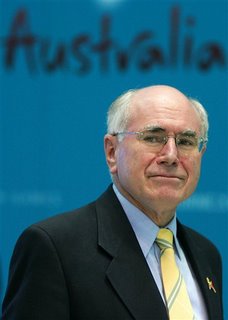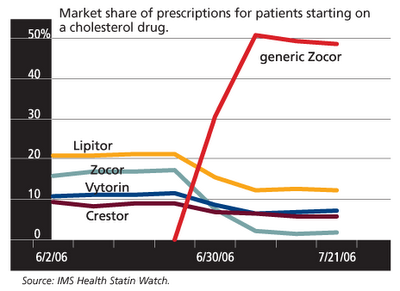Peter Rost, M.D., is a former Pfizer Marketing Vice President providing services as a medical device and drug expert witness and pharmaceutical marketing expert. Judge Sanders: "The court agrees with defendants' view that Dr. Rost is a very adept and seasoned expert witness." He is also the author of Emergency Surgery, The Whistleblower and Killer Drug. You can reach him on rostpeter (insert symbol) hotmail.com. Follow on https://twitter.com/peterrost
Thursday, August 31, 2006
PharmaGossip: "One Air Pfizer - the only way to fly"
Too funny. Rush over and watch jet video.
PharmaMarketing Covers Pfizer's Jet-gate
Uh-oh. The Pfizer Jet story is taking on its own life. Another incredibly well informed blog, PharmaMarketing, is adding some background to Pfizer's Jet-gate.
Here is the post, Kindler, Cheney: Kindred Spirits? Don't miss reading!
I'd say, a couple of more weeks and Pfizer will file a revised statement with the SEC about no kids travling on jets. The pressure is building.
Or as PharmaMarketing says, "Whatever the case, many commenters expect this story to be picked up by the mainstream press -- I'm guessing after Labor Day."
Here is the post, Kindler, Cheney: Kindred Spirits? Don't miss reading!
I'd say, a couple of more weeks and Pfizer will file a revised statement with the SEC about no kids travling on jets. The pressure is building.
Or as PharmaMarketing says, "Whatever the case, many commenters expect this story to be picked up by the mainstream press -- I'm guessing after Labor Day."
Peter Rost E-mail
I know a few people out there are trying to reach me, and just to make things easy, here's my e-mail address: rostpeter(insert @)hotmail.com. I guess Google will eventually find that.
Perhaps I should add Peter Rost e-mail Peter Rost e-mail Peter Rost e-mail Peter Rost e-mail Peter Rost e-mail Peter Rost e-mail Peter Rost e-mail Peter Rost e-mail Peter Rost e-mail Peter Rost e-mail Peter Rost e-mail Peter Rost e-mail Peter Rost e-mail Peter Rost e-mail Peter Rost e-mail Peter Rost e-mail Peter Rost e-mail Peter Rost e-mail Peter Rost e-mail Peter Rost e-mail Peter Rost e-mail a few times and the search engines will do the rest.
SO, if you have a tip (such as the reader who posted on Cafe Pharma about the Pfizer jets), please let me know!
Perhaps I should add Peter Rost e-mail Peter Rost e-mail Peter Rost e-mail Peter Rost e-mail Peter Rost e-mail Peter Rost e-mail Peter Rost e-mail Peter Rost e-mail Peter Rost e-mail Peter Rost e-mail Peter Rost e-mail Peter Rost e-mail Peter Rost e-mail Peter Rost e-mail Peter Rost e-mail Peter Rost e-mail Peter Rost e-mail Peter Rost e-mail Peter Rost e-mail Peter Rost e-mail Peter Rost e-mail a few times and the search engines will do the rest.
SO, if you have a tip (such as the reader who posted on Cafe Pharma about the Pfizer jets), please let me know!
PharmaGossip takes on the Pfizer Jet
PharmaGossip, the blog I could only dream of emulating, is picking up where I left off.
That is of course quite an honor. For me.
Go here and check out PharmaGossip's entertaining post.
That is of course quite an honor. For me.
Go here and check out PharmaGossip's entertaining post.
Wednesday, August 30, 2006
Pfizer CEO's Jet-gate?
 The debate rages on over at Cafe Pharma and the thread about the Pfizer CEO's jet which may soon turn into a full blown Jet-gate.
The debate rages on over at Cafe Pharma and the thread about the Pfizer CEO's jet which may soon turn into a full blown Jet-gate.Last few posts argue that I'm the one pasting my URL and quotes from my posts. Pfizer's Anonymous Defenders of Mr. Kindler's Jet Privileges don't seem to fathom that perhaps other Pfizer employees may agree with me and are doing this. As for me, I'm just sitting back and enjoying the show.
And now to the interesting part.
Someone on Cafe Pharma, who claims to know the content of Jeff Kindler's CEO employment contract, claims that the Pfizer SEC filing saying that "Mr. Kindler and his spouse and dependent children will be required to use aircraft provided by the Company for air travel for security reasons." IS NOT TRUE.
And of course, in the name of balance I need to inform you of this. Because if Pfizer's SEC filing is FALSE, then all my posts on this topic should be disregarded. Then, there is no party jet; at least not without Mr. Kindler as part of the party, so to speak.
The person who knows so much writes, "Yes, I am aware what the 8K says. However, I assure you, according to Jeff Kindler's actual contract (not the 8K) his family is NOT required to travel on corporate aircraft."
So if true, there is no "party jet." If true, there may be something much worse: False filing with the SEC.
Now, why would anyone do that? (We don't know if anyone did this, we just give the Anonymous Defenders of Mr. Kindler's Jet Privileges on Cafe Pharma the benefit of the doubt.)
And this is how the Anonymous Defender of Mr. Kindler's Jet Privileges continues, "Perhaps Pfizer "lied" on their 8-K, but I doubt it. It doesn't really help the company to portray an executive perk as more generous than it actually is. I don't know why the language in the 8-K is written this way -- perhaps it's a lousy translation of the components of Kindler's compensation and perks."
Now then, is that really true?
Is it true that it doesn't help the company to portray an executive perk as more generous than it actually is?
It may be. But it may help the CEO and his kids. There could be a MOTIVE behind this alleged fraud . . .
Here's the deal, you see.
Maybe Pfizer doesn't want to have teenagers going willy-nilly on their $30 million jets. Maybe they will rarely if ever use the jet. Or just occasionally, with daddy.
So why put in such language?
Simple.
Because, and hang in with me here, the language on http://www.jetsales.com/mesinger/aag/personaluseflights.html is stilted but explains things:
"The amount of income imputed to an employee for personal flights may be reduced if the employer requires the employee to travel on an employer-provided aircraft for all flights, both business and personal, and if a bona fide business-related security justification for such requirement exists. This special valuation . . . will not exceed 200% regardless of the weight of the aircraft. The remainder of the calculation remains unchanged."
Normally for a Gulfstream, the factor is 400%, so this rule cuts the tax burden in half for the CEO and his children, anytime they fly. IF there is a security concern and there is official documentation on this, including the SEC filing.
But there's more going on. The IRS doesn't just accept these arrangements at face value: "Even if an actual basis for concern exists, the general rule established by the Treasury Regulations provides that the IRS will consider it to be a bona fide security concern only if the employer establishes an overall security program acceptable to the IRS with respect to the employee. Such a program must provide security to the employee on a 24 hour-a-day basis, including security at the employee's residence and workplace, and while traveling, whether for business or personal reasons. In addition, the program must include the use of a bodyguard-chauffeur who is trained in evasive driving techniques, an automobile specially equipped for security, and guards, metal detectors, alarms, or similar methods of controlling access to the employee's workplace and residence. An overall security program will be deemed to exist if it is established pursuant to an independent security study (discussed below)."
So, if Pfizer told the IRS or the SEC that sometimes it is OK for the kids to go on regular flights from Newark, and sometimes there is a big security concern that necessitates trips to Bermudas on a private jet, then maybe the IRS wouldn't agree to give them a 50% discount on taxes for the free party jet. And then, the kids would have to pay $1800 tax instead of $900 tax to fly round trip to Paris.
Solution? File an 8-K saying the whole family has a security concern. Only in real life there isn't so much of a concern, so there won't be any jets anytime for the kids, just sometimes. The rest of the time they have to fly like the rest of us.
I don't know if that is what is going on here. But someone claims Pfizer has made a false filing with the SEC. Someone who got real scared when he discovered the doo-doo he put the company in.
Perhaps, we'll find out the truth when the Pfizer CEO's little Jet-gate blows up in the mainstream press.
Party Jet or false SEC filing, which one is it?
Shareholders have a right to know.
And you heard it here first.
Schering-Plough Bites the Dust. Oh Yeahhhh!
US Attorney Statement: "Delaware corporation SCHERING-PLOUGH CORPORATION, together with its subsidiary, SCHERING SALES CORPORATION have agreed to pay a total of $435,000,000 to resolve criminal charges and civil liabilities in connection with illegal sales and marketing programs."
Schering-Plough Statement: In connection with the settlement, Schering-Plough Corporation will also sign an addendum to an existing corporate integrity agreement with the Office of Inspector General of the U.S. Department of Health and Human Services. The addendum will not affect Schering-Plough Corporation's ongoing business with any customers, including the federal government. The company believes the settlement of the Massachusetts Investigation will not have a material adverse effect on the Company's results of operations, cash flows, financial condition or its business.
Translation of Schering-Plough Statement: YEAAAH! Business as usual! WE don't caaaare about the frigging 435 million. You can't put a company in jail, just make us sign another sh-tty piece of paper. Our sales are over $10 billion per year, we make 435 mill in just two weeks.
Peter Rost Statement: What do you call an individual convicted of a crime? A criminal! What do you sing when a criminal corporation is convicted of crimes? ANOTHER ONE BITES THE DUST!
QUEEN: "ANOTHER ONE BITES THE DUST" WARNING, VERY STRONG IMAGES.
Text of Statement by U.S. Attorney
On Settlement With Schering-Plough
August 29, 2006 12:16 p.m.
Schering to Pay $435 Million for the Improper Marketing of Drugs and Medicaid Fraud, Reports U.S. Attorney
BOSTON, Aug. 29 -- Delaware corporation SCHERING-PLOUGH CORPORATION,together with its subsidiary, SCHERING SALES CORPORATION have agreed to pay a total of $435,000,000 to resolve criminal charges and civil liabilities in connection with illegal sales and marketing programs for its drugs Temodar for use in the treatment of brain tumors and metastases, and Intron A for use in treatment of superficial bladder cancer and hepatitis C. The resolution also pertains to Medicaid fraud involving Schering's drugs Claritin RediTabs, a nonsedating antihistamine, and K-Dur, used in treating stomach conditions.
United States Attorney for the District of Massachusetts Michael J. Sullivan, Department of Health and Human Services Regional Inspector General Joseph Moraski, United States Food and Drug Administration Special Agent in Charge Mark Dragonetti, Department of Defense Criminal Investigative Service Special Agent in Charge Edward Bradley, and Department of Veteran's Affairs Special Agent in Charge Jeffrey Hughes announced today that SCHERING SALES CORPORATION will pay a $180,000,000 criminal fine and, together with SCHERING-PLOUGH CORPORATION, another $255,000,000 to settle civil liabilities. Today's global resolution ensures that the federal Medicaid program and each of the State Medicaid agencies which paid for prescriptions of Claritin RediTabs and K-Dur will obtain the benefit of the best price offered by Schering to commercial purchasers of those drugs, and will ensure that Schering pays appropriate damages for improperly promoting its drugs for uses not approved by the FDA and from offering or paying kickbacks to physicians to prescribe those drugs.
"The Justice Department is committed to rooting out and prosecuting health care fraud," said Deputy Attorney General Paul J. McNulty. "It is vital to public health and safety that pharmaceutical companies are deterred from improperly marketing their drugs to doctors and patients to treat illnesses that these drugs are not approved to treat. This settlement sends a clear message to the pharmaceutical industry that the Justice Department will not tolerate these deceptive and illegal marketing practices."
"The American people, as both taxpayers and consumers, expect our health care system to be free from fraud and corruption," stated U.S. Attorney Michael J. Sullivan. "The pharmaceutical industry has an obligation to ensure that all rules, regulations and laws are complied with. To do less erodes public confidence, compromises the patient physician relationship and adds costs to important government programs. We will not tolerate attempts to profit at the expense of the ill and needy in our society."
To resolve the criminal charges, SCHERING SALES CORPORATION has agreed to plead guilty to a one count criminal conspiracy to make false statements to both the Food and Drug Administration regarding its improper drug promotional activity and to the Health Care Financing Administration regarding its best price for certain drugs, and to pay a $180,000,000 criminal fine. As a result of its criminal conviction, SCHERING SALES will be excluded permanently from participation in all federal health care programs.
SCHERING PLOUGH CORPORATION also agreed to settle its civil False Claims
Act liabilities and liabilities under the Food Drug and Cosmetic Act for a total of $255,025,000. Specifically, SCHERING will pay $159,502,000, plus interest, to the United States in civil damages for losses suffered by the Medicare program, the federal portion of the Medicaid program, the Veteran's Administration, the Department of Defense and the Federal Employees Health Benefits program as a result of SCHERING's improper drug promotion and marketing misconduct, and Medicaid rebate fraud. SCHERING will also pay a total of $91,602,000, plus interest, to settle its civil liabilities to the fifty states and the District of Columbia for losses the state Medicaid programs suffered. In addition, SCHERING will refund $3,921,090 to the Public Health Service (PHS) programs that also were entitled to a lower price on certain drugs.
The first object of the conspiracy to which SCHERING SALES will plead guilty charges that it conspired with others to give free Claritin Redi-Tabs to a major health maintenance organization to disguise a new lower price being offered to the HMO to obtain its business. Drug manufacturers are required to report their best price on drugs provided to certain commercial customers, including HMOs, to the Health Care Financing Administration ("HCFA"), and to pay quarterly rebates to the Medicaid program, the nation's taxpayer funded health insurance program for the poor and disabled, to be sure the Medicaid program obtains the benefit of that low price. From April 1998 through 1999, SCHERING SALES reported a false best price to HCFA, which failed to include the new low price of Claritin Redi-Tabs provided to the HMO, to avoid paying millions of dollars in additional rebates to the Medicaid program.
"Investigation of prescription drug fraud is a priority of the Office of Inspector General (OIG) and resolution of this case stems from OIG's strong relationship with our law-enforcement partners," said Daniel R. Levinson, Inspector General of the U.S. Department of Health and Human Services. "In addition to enforcement, OIG strongly supports implementation of compliance measures by pharmaceutical companies that are designed to address all risk areas of their business -- whether they be pricing, marketing or promotional practices. The expanded Corporate Integrity Agreement with Schering-Plough incorporates additional ways for OIG and the Company to monitor these issues and minimize the risk of off-label promotion."
"The Centers for Medicare & Medicaid Services is committed to protect the Medicare program for beneficiaries and taxpayers, and with the implementation of the prescription drug benefit, it is even more important for the Government to fully investigate health care fraud relating to prescription drugs," said CMS Administrator Mark B. McClellan, M.D., Ph.D. "At the same time, drug manufacturers have a duty to implement strong compliance measures that will address all risk areas of their business including pricing, marketing or promotions."
The second object of the conspiracy to which SCHERING SALES will plead guilty charges that it conspired with others to make false statements to the FDA in response to the FDA's inquiry regarding certain illegal promotional activities by the Company's sales representatives at a national medical conference for oncologists. Those false statements were designed to reassure the FDA that the promotional activities were isolated and not directed by home office, when in fact, the activities were widespread and part of the national marketing plan. In addition, the Company sought to falsely lull the FDA into believing that it had taken appropriate steps to reinforce the message with its sales representatives that such promotional activities were prohibited, when in fact, the Company knew and expected that those activities would continue.
"The FDA takes seriously its responsibilities to protect consumers from products that are promoted for unapproved uses," says Margaret Glavin, the FDA's Associate Commissioner for regulatory affairs. "Pharmaceutical manufacturers who mislead FDA place consumers at risk."
The civil settlement resolves allegations that SCHERING-PLOUGH CORPORATION and SCHERING SALES knowingly caused the submission of false and/or fraudulent claims for SCHERING'S drugs that were not eligible for reimbursement. These included the government's claims that (1) SCHERING misreported its best price to HCFA on Claritin ReidTabs to evade Medicaid rebate liability, (2) SCHERING misreported its best price on private-labeled K-Dur to HCFA to evade Medicaid rebate liability, (3) SCHERING overcharged the PHS entities because of its misreporting of best price to HCFA, (4) SCHERING induced physicians to start patients on Intron A for Hepatitis C by paying them remuneration through three marketing programs, (5) SCHERING induced physicians to use Temodar for certain patients with brain tumors and brain metastases and to use Intron A for certain patients with superficial bladder cancer through improper preceptorships, sham advisory boards, lavish entertainment, and improper placement of clinical trials; and (6) SCHERING knowingly promoted off label uses of Temodar for certain brain tumors and brain metastases and Intron A for superficial bladder cancer despite not having FDA approval.
SCHERING-PLOUGH CORPORATION will be subject to an amendment to its existing Corporate Integrity Agreement. That amendment requires Schering to continue extensive work that the Company has undertaken in the last two years to monitor and correct the shortcomings in Schering's drug sales, marketing and pricing activities. After the activities were uncovered by the government, SCHERING-PLOUGH cooperated with the investigation and actively worked on compliance issues through a significantly expanded compliance department.
The investigation was conducted by the Food and Drug Administration's Regional Office of Criminal Investigations in both Boston and Miami; the Department of Health and Human Services' Office of Inspector General, Office of Investigations; the Defense Criminal Investigative Service of the Department of Defense; and the United States Office of Veteran's Affairs' Office of the Inspector General.
Assistance in the investigation was also provided by Patrick Lupinetti, Director of the New York State Attorney General's Special Projects and Medicaid Fraud Control Unit and David Waterbury, Director of the Washington State Attorney's General's Medicaid Fraud Control Unit, who coordinated the National Medicaid Fraud Units. The criminal investigation and resolution were handled by Assistant U.S. Attorneys Susan Winkler, Chief of Sullivan's Health Care Fraud Unit, and Jeremy Sternberg. The civil investigation and settlement were handled by Assistant U.S. Attorneys Susan Winkler, Jennifer Boal, Chief of Sullivan's Civil Division, Gregg Shapiro, and Department of Justice Trial Attorney Andy Mao of the Fraud Section of the Civil Division. The Amendment to the Corporate Integrity Agreement was negotiated by Senior Counsel Mary Riordan in the Office of General Counsel in the Department of Health and Human Services, Office of Inspector General.
Schering-Plough Statement: In connection with the settlement, Schering-Plough Corporation will also sign an addendum to an existing corporate integrity agreement with the Office of Inspector General of the U.S. Department of Health and Human Services. The addendum will not affect Schering-Plough Corporation's ongoing business with any customers, including the federal government. The company believes the settlement of the Massachusetts Investigation will not have a material adverse effect on the Company's results of operations, cash flows, financial condition or its business.
Translation of Schering-Plough Statement: YEAAAH! Business as usual! WE don't caaaare about the frigging 435 million. You can't put a company in jail, just make us sign another sh-tty piece of paper. Our sales are over $10 billion per year, we make 435 mill in just two weeks.
Peter Rost Statement: What do you call an individual convicted of a crime? A criminal! What do you sing when a criminal corporation is convicted of crimes? ANOTHER ONE BITES THE DUST!
QUEEN: "ANOTHER ONE BITES THE DUST" WARNING, VERY STRONG IMAGES.
Text of Statement by U.S. Attorney
On Settlement With Schering-Plough
August 29, 2006 12:16 p.m.
Schering to Pay $435 Million for the Improper Marketing of Drugs and Medicaid Fraud, Reports U.S. Attorney
BOSTON, Aug. 29 -- Delaware corporation SCHERING-PLOUGH CORPORATION,together with its subsidiary, SCHERING SALES CORPORATION have agreed to pay a total of $435,000,000 to resolve criminal charges and civil liabilities in connection with illegal sales and marketing programs for its drugs Temodar for use in the treatment of brain tumors and metastases, and Intron A for use in treatment of superficial bladder cancer and hepatitis C. The resolution also pertains to Medicaid fraud involving Schering's drugs Claritin RediTabs, a nonsedating antihistamine, and K-Dur, used in treating stomach conditions.
United States Attorney for the District of Massachusetts Michael J. Sullivan, Department of Health and Human Services Regional Inspector General Joseph Moraski, United States Food and Drug Administration Special Agent in Charge Mark Dragonetti, Department of Defense Criminal Investigative Service Special Agent in Charge Edward Bradley, and Department of Veteran's Affairs Special Agent in Charge Jeffrey Hughes announced today that SCHERING SALES CORPORATION will pay a $180,000,000 criminal fine and, together with SCHERING-PLOUGH CORPORATION, another $255,000,000 to settle civil liabilities. Today's global resolution ensures that the federal Medicaid program and each of the State Medicaid agencies which paid for prescriptions of Claritin RediTabs and K-Dur will obtain the benefit of the best price offered by Schering to commercial purchasers of those drugs, and will ensure that Schering pays appropriate damages for improperly promoting its drugs for uses not approved by the FDA and from offering or paying kickbacks to physicians to prescribe those drugs.
"The Justice Department is committed to rooting out and prosecuting health care fraud," said Deputy Attorney General Paul J. McNulty. "It is vital to public health and safety that pharmaceutical companies are deterred from improperly marketing their drugs to doctors and patients to treat illnesses that these drugs are not approved to treat. This settlement sends a clear message to the pharmaceutical industry that the Justice Department will not tolerate these deceptive and illegal marketing practices."
"The American people, as both taxpayers and consumers, expect our health care system to be free from fraud and corruption," stated U.S. Attorney Michael J. Sullivan. "The pharmaceutical industry has an obligation to ensure that all rules, regulations and laws are complied with. To do less erodes public confidence, compromises the patient physician relationship and adds costs to important government programs. We will not tolerate attempts to profit at the expense of the ill and needy in our society."
To resolve the criminal charges, SCHERING SALES CORPORATION has agreed to plead guilty to a one count criminal conspiracy to make false statements to both the Food and Drug Administration regarding its improper drug promotional activity and to the Health Care Financing Administration regarding its best price for certain drugs, and to pay a $180,000,000 criminal fine. As a result of its criminal conviction, SCHERING SALES will be excluded permanently from participation in all federal health care programs.
SCHERING PLOUGH CORPORATION also agreed to settle its civil False Claims
Act liabilities and liabilities under the Food Drug and Cosmetic Act for a total of $255,025,000. Specifically, SCHERING will pay $159,502,000, plus interest, to the United States in civil damages for losses suffered by the Medicare program, the federal portion of the Medicaid program, the Veteran's Administration, the Department of Defense and the Federal Employees Health Benefits program as a result of SCHERING's improper drug promotion and marketing misconduct, and Medicaid rebate fraud. SCHERING will also pay a total of $91,602,000, plus interest, to settle its civil liabilities to the fifty states and the District of Columbia for losses the state Medicaid programs suffered. In addition, SCHERING will refund $3,921,090 to the Public Health Service (PHS) programs that also were entitled to a lower price on certain drugs.
The first object of the conspiracy to which SCHERING SALES will plead guilty charges that it conspired with others to give free Claritin Redi-Tabs to a major health maintenance organization to disguise a new lower price being offered to the HMO to obtain its business. Drug manufacturers are required to report their best price on drugs provided to certain commercial customers, including HMOs, to the Health Care Financing Administration ("HCFA"), and to pay quarterly rebates to the Medicaid program, the nation's taxpayer funded health insurance program for the poor and disabled, to be sure the Medicaid program obtains the benefit of that low price. From April 1998 through 1999, SCHERING SALES reported a false best price to HCFA, which failed to include the new low price of Claritin Redi-Tabs provided to the HMO, to avoid paying millions of dollars in additional rebates to the Medicaid program.
"Investigation of prescription drug fraud is a priority of the Office of Inspector General (OIG) and resolution of this case stems from OIG's strong relationship with our law-enforcement partners," said Daniel R. Levinson, Inspector General of the U.S. Department of Health and Human Services. "In addition to enforcement, OIG strongly supports implementation of compliance measures by pharmaceutical companies that are designed to address all risk areas of their business -- whether they be pricing, marketing or promotional practices. The expanded Corporate Integrity Agreement with Schering-Plough incorporates additional ways for OIG and the Company to monitor these issues and minimize the risk of off-label promotion."
"The Centers for Medicare & Medicaid Services is committed to protect the Medicare program for beneficiaries and taxpayers, and with the implementation of the prescription drug benefit, it is even more important for the Government to fully investigate health care fraud relating to prescription drugs," said CMS Administrator Mark B. McClellan, M.D., Ph.D. "At the same time, drug manufacturers have a duty to implement strong compliance measures that will address all risk areas of their business including pricing, marketing or promotions."
The second object of the conspiracy to which SCHERING SALES will plead guilty charges that it conspired with others to make false statements to the FDA in response to the FDA's inquiry regarding certain illegal promotional activities by the Company's sales representatives at a national medical conference for oncologists. Those false statements were designed to reassure the FDA that the promotional activities were isolated and not directed by home office, when in fact, the activities were widespread and part of the national marketing plan. In addition, the Company sought to falsely lull the FDA into believing that it had taken appropriate steps to reinforce the message with its sales representatives that such promotional activities were prohibited, when in fact, the Company knew and expected that those activities would continue.
"The FDA takes seriously its responsibilities to protect consumers from products that are promoted for unapproved uses," says Margaret Glavin, the FDA's Associate Commissioner for regulatory affairs. "Pharmaceutical manufacturers who mislead FDA place consumers at risk."
The civil settlement resolves allegations that SCHERING-PLOUGH CORPORATION and SCHERING SALES knowingly caused the submission of false and/or fraudulent claims for SCHERING'S drugs that were not eligible for reimbursement. These included the government's claims that (1) SCHERING misreported its best price to HCFA on Claritin ReidTabs to evade Medicaid rebate liability, (2) SCHERING misreported its best price on private-labeled K-Dur to HCFA to evade Medicaid rebate liability, (3) SCHERING overcharged the PHS entities because of its misreporting of best price to HCFA, (4) SCHERING induced physicians to start patients on Intron A for Hepatitis C by paying them remuneration through three marketing programs, (5) SCHERING induced physicians to use Temodar for certain patients with brain tumors and brain metastases and to use Intron A for certain patients with superficial bladder cancer through improper preceptorships, sham advisory boards, lavish entertainment, and improper placement of clinical trials; and (6) SCHERING knowingly promoted off label uses of Temodar for certain brain tumors and brain metastases and Intron A for superficial bladder cancer despite not having FDA approval.
SCHERING-PLOUGH CORPORATION will be subject to an amendment to its existing Corporate Integrity Agreement. That amendment requires Schering to continue extensive work that the Company has undertaken in the last two years to monitor and correct the shortcomings in Schering's drug sales, marketing and pricing activities. After the activities were uncovered by the government, SCHERING-PLOUGH cooperated with the investigation and actively worked on compliance issues through a significantly expanded compliance department.
The investigation was conducted by the Food and Drug Administration's Regional Office of Criminal Investigations in both Boston and Miami; the Department of Health and Human Services' Office of Inspector General, Office of Investigations; the Defense Criminal Investigative Service of the Department of Defense; and the United States Office of Veteran's Affairs' Office of the Inspector General.
Assistance in the investigation was also provided by Patrick Lupinetti, Director of the New York State Attorney General's Special Projects and Medicaid Fraud Control Unit and David Waterbury, Director of the Washington State Attorney's General's Medicaid Fraud Control Unit, who coordinated the National Medicaid Fraud Units. The criminal investigation and resolution were handled by Assistant U.S. Attorneys Susan Winkler, Chief of Sullivan's Health Care Fraud Unit, and Jeremy Sternberg. The civil investigation and settlement were handled by Assistant U.S. Attorneys Susan Winkler, Jennifer Boal, Chief of Sullivan's Civil Division, Gregg Shapiro, and Department of Justice Trial Attorney Andy Mao of the Fraud Section of the Civil Division. The Amendment to the Corporate Integrity Agreement was negotiated by Senior Counsel Mary Riordan in the Office of General Counsel in the Department of Health and Human Services, Office of Inspector General.
Tuesday, August 29, 2006
The Cost of Pfizer's Two Party Jets
 The information in my post New Pfizer CEO's Party Jet for Kiddies appears to have sparked a debate within Pfizer about CEO Jeff Kindler's new fringe benefits. At least there's an interesting debate going on over at Pfizer's board on Cafe Pharma, with sales reps upset and someone who appears to come from management or a PR firm defending the perk.
The information in my post New Pfizer CEO's Party Jet for Kiddies appears to have sparked a debate within Pfizer about CEO Jeff Kindler's new fringe benefits. At least there's an interesting debate going on over at Pfizer's board on Cafe Pharma, with sales reps upset and someone who appears to come from management or a PR firm defending the perk.Additionally, I learned in an e-mail from a subscriber that we can find out about Pfizer's corporate planes and he also posted that information on the thread above.
So I decided that it might might be fun to look closer at the cost of Pfizer's party jets. Those are G-Vs in the pictures, and Pfizer owns two of them, plus a helicopter.
But before we start looking closer at the cost of Pfizer's party jets, let's step back a second and correct all the Cafe Pharma misinformation about "nothing having changed with Mr. Kindler" and that "Mr. McKinnell also took his girlfriend on flights." Based on the information Pfizer has provided, Mr. McKinnell could bring family with him on the plane, when he was on the plane. Mr. Kindler has ensured that his family is required to always use the plane. Big difference.
 The old rules at Pfizer were simple. According to Pfizer's proxy statement, "A spouse/partner was allowed to accompany the EC member on the aircraft for Pfizer business purposes;" so McKinnell could bring a spouse or partner and allegedly did so. It also says, "For tax purposes, as a result of the recommendations contained in an independent, third-party security study, the Board of Directors passed a resolution requiring that Dr. McKinnell use Company aircraft for personal travel. Under IRS regulations, if there is an independent, third-party security study, such personal use is valued at two times the Standard Industry Fare Level (SIFL) rates, as published by the IRS. "
The old rules at Pfizer were simple. According to Pfizer's proxy statement, "A spouse/partner was allowed to accompany the EC member on the aircraft for Pfizer business purposes;" so McKinnell could bring a spouse or partner and allegedly did so. It also says, "For tax purposes, as a result of the recommendations contained in an independent, third-party security study, the Board of Directors passed a resolution requiring that Dr. McKinnell use Company aircraft for personal travel. Under IRS regulations, if there is an independent, third-party security study, such personal use is valued at two times the Standard Industry Fare Level (SIFL) rates, as published by the IRS. "So what is that? Let me explain. It means that if Kindler takes a pleasure trip from New York to Paris, a round trip distance of about 7270 miles, he would have a taxable benefit of about $2,250, which would be added on his taxable income. But since taxes are only about 40% of income, that means he doesn't actually pay more than $900 for this luxury, about the same cost as a regular, restricted coach ticket to Paris.
 For calculation see here and IRS info here with a special exception rule cutting cost in half, here, since "the amount of income imputed to an employee for personal flights may be reduced if the employer requires the employee to travel on an employer-provided aircraft for all flights, both business and personal, and if a bona fide business-related security justification for such requirement exists."
For calculation see here and IRS info here with a special exception rule cutting cost in half, here, since "the amount of income imputed to an employee for personal flights may be reduced if the employer requires the employee to travel on an employer-provided aircraft for all flights, both business and personal, and if a bona fide business-related security justification for such requirement exists."We also know that McKinnell per Pfizer's recent proxy statement had a fringe benefit of $43,855 for air travel, so that's equivalent to a private trip for two on the corporate jet to Paris every month. Karen Katen spent twice as much.
But of course the cost to Pfizer's share holders is much more than these tiny amounts. A Gulfstream V, such as the one Mr. Kindler flies, costs about $30 million to buy. To get an idea of just how much it costs to operate such a jet, we can take a look at the pricing at Sentinet, which prices older Gulfstream IV jets at $8,200 per hour, for those who can't afford to buy one. That's about $150,000 for a round trip to Paris. But when you own the jet it has downtime, and we also haven't calculated cost of purchase and depreciation of the newer and larger Gulfstream V, so expect the cost for Pfizer share holders to easily reach $300,000. And for this benefit, Mr. Kindler pays less than 1% of the real cost, out of his pocket in taxes, $900.
Please also note that Mr. Kindler's contract differs from the information about Mr. McKinnell. In Kindler's new contract it explicitly states that "Mr. Kindler and his spouse and dependent children will be required [my italics] to use aircraft provided by the Company for air travel for security reasons."
So what does this mean?
 It can't really mean anything but what it says, which is that contrary to when Mr. McKinnell's family came along on trips he took, the Kindler family expects to use the G-V aircraft anytime they fly, and Mr. Kindler doesn't have to be present.
It can't really mean anything but what it says, which is that contrary to when Mr. McKinnell's family came along on trips he took, the Kindler family expects to use the G-V aircraft anytime they fly, and Mr. Kindler doesn't have to be present.After all, if they don't follow this requirement and other precautions in a comprehensive security package, the whole situation may be questioned by the IRS.
To learn about the security program the IRS requires, go here.
And since Mr. Kindler has an 18-year old daughter and a 20-years old son, one can only imagine how much fun they will have in the air, without daddy around, courtesy of Pfizer shareholders. After all they are required to take daddy's jet, part of the "security program."
No choice there at all.
Swedish Protest Music
It has been brought to my attention from liberal Swedish readers that my selection of Swedish music was lacking. So to rectify that, here are three classics, from the mid 80s and forward.
First out, anti-establishment prog group Ebba Grön with "Mamma pappa barn" or Mother, Father, Child. Later they became the establishment, due to their local success . . .
And then we have something different: Imperiet or "The Empire" in English with "Blå Himlen Blues" or "Blue Heaven Blues." I know, I know, you may think that they look like people lost from a gay bar in San Francisco, but I think they resemble Russian sailors singing a very longing Russian folk song. That's it. It is gooooooooood. Oh, the hat is actually from the Salvation Army. Pay close attention and you'll see.
And I'll end the music with Ebba Grön & Eldkvarn featuring "Flyktsoda Live." By the way, to be "left" in Sweden or any European country is very, very different from being "left" in the U.S. But, of course, you don't have to be anything to like good music with a local touch . . .
First out, anti-establishment prog group Ebba Grön with "Mamma pappa barn" or Mother, Father, Child. Later they became the establishment, due to their local success . . .
And then we have something different: Imperiet or "The Empire" in English with "Blå Himlen Blues" or "Blue Heaven Blues." I know, I know, you may think that they look like people lost from a gay bar in San Francisco, but I think they resemble Russian sailors singing a very longing Russian folk song. That's it. It is gooooooooood. Oh, the hat is actually from the Salvation Army. Pay close attention and you'll see.
And I'll end the music with Ebba Grön & Eldkvarn featuring "Flyktsoda Live." By the way, to be "left" in Sweden or any European country is very, very different from being "left" in the U.S. But, of course, you don't have to be anything to like good music with a local touch . . .
Monday, August 28, 2006
Machines Against Drug Reps
 MedAdNews warns drug companies that they "must improve their communication with physicians and patients to offset the threat posed by machines distributing generic samples and information, which are being used in an increasing number of doctors's offices.
MedAdNews warns drug companies that they "must improve their communication with physicians and patients to offset the threat posed by machines distributing generic samples and information, which are being used in an increasing number of doctors's offices.Here's the deal. These machines (picture) dispense generic drug samples in the doctor's office and are automatically replenished by the company, MedVantx, which put them there. Doctors save time, patients save money and healthplans love the idea. So they are pushing hard.
So far, 1,800 docs and 250,000 patients have tried the machine.
Sales reps all over the country are shivering, seeing their most important tool to access the doctor, branded drug samples, threatened.
More Pfizer Management Changes?
It looks like the management shake-up at Pfizer may not yet be over.
Anyone who has followed this blog knows that after Pfizer CEO Jeff Kindler took over from Hank McKinnell, Vice Chairman Karen Katen decided to leave the company and Mr. Kindler also decided to remove Pat Kelly, who was head of U.S. Pharmaceuticals, from his position. In a company announcement Mr. Kindler wrote that "Pat is looking at other career opportunities within Pfizer where he can apply his extensive knowledge of our industry as well as his leadership experience." Problem is that there does not appear to be any position of similar importance as the one he was forced to leave . . . so this action speaks for itself.
And Mr. Kindler also wrote that "Marie-Caroline Sainpy continues in her dual role as head of marketing for the U.S. and Worldwide," reporting to Peter Brandt, the new U.S. head and to Ian Read, who assumed global responsibility for Worldwide Pharmaceutical Operations.
But with all the people gone whom Mari-Caroline used to report to, including Pat and Karen, it may not be surprising if she is talking to a few recruiters.
In fact, I have solid information (wouldn't dare make this statement otherwise) that SPENCER STUART INTERNATIONAL, one of the preeminent global search firms, spent some time last week researching Marie-Caroline Sainpy.
This could mean that Ms. Sainpy has approached Spencer Stuart or that they are pursuing her about a job outside Pfizer. In fact, recruiters must have a field day with Pfizer right now, since the uncertainty of a new management means employees don't know if they are safe.
You heard it here first.
Anyone who has followed this blog knows that after Pfizer CEO Jeff Kindler took over from Hank McKinnell, Vice Chairman Karen Katen decided to leave the company and Mr. Kindler also decided to remove Pat Kelly, who was head of U.S. Pharmaceuticals, from his position. In a company announcement Mr. Kindler wrote that "Pat is looking at other career opportunities within Pfizer where he can apply his extensive knowledge of our industry as well as his leadership experience." Problem is that there does not appear to be any position of similar importance as the one he was forced to leave . . . so this action speaks for itself.
And Mr. Kindler also wrote that "Marie-Caroline Sainpy continues in her dual role as head of marketing for the U.S. and Worldwide," reporting to Peter Brandt, the new U.S. head and to Ian Read, who assumed global responsibility for Worldwide Pharmaceutical Operations.
But with all the people gone whom Mari-Caroline used to report to, including Pat and Karen, it may not be surprising if she is talking to a few recruiters.
In fact, I have solid information (wouldn't dare make this statement otherwise) that SPENCER STUART INTERNATIONAL, one of the preeminent global search firms, spent some time last week researching Marie-Caroline Sainpy.
This could mean that Ms. Sainpy has approached Spencer Stuart or that they are pursuing her about a job outside Pfizer. In fact, recruiters must have a field day with Pfizer right now, since the uncertainty of a new management means employees don't know if they are safe.
You heard it here first.
Friday, August 25, 2006
Abortion and the Next-Day Pill
Yesterday one of the most contentious issues in FDA's 100-year history was resolved. Not my opinion--New York Times' words.
The FDA approved over-the-counter sales of the morning-after contraceptive pill to women 18 years or older. And to men.
Abortion rights advocates are celebrating and abortion opponents are seething.
And that is too bad. I started out as a physician and if you practice medicine you have to be, to a certain extent, a realist. You may say a prayer before surgery but you don't expect the organs to miraculously heal themselves. At least you wouldn' t bet your own life on it.
Nor would many abortion opponents.
But they do believe that pushing their religious beliefs on others, stopping abortions would somehow make this a better world. The fact that before legalized abortion, the world was filled with back alleys and women dying after metal cloth hanger procedures is something they simply care very little about.
 And this is where I am a realist, I think. Abortions will always take place, so we better make them as humane as possible.
And this is where I am a realist, I think. Abortions will always take place, so we better make them as humane as possible.
I don’t like abortions. I wouldn’t want my wife to have one. I wouldn’t really want to perform them. But I am grateful that some doctors do give women this last resort option.
We need to keep abortion legal. And even more important, we need to make options, such as the next-day pill, readily available to minimize the number of abortions.
Because, after all, abortions are a terrible thing. If you haven’t been part of one you simply don’t understand.
As a medical student I was part of many. And I can assure you that there were not one happy, giddy, woman waiting for her abortion. It is not something a woman does lightly.
 And it is not something casual for the doctor.
And it is not something casual for the doctor.
After he has sucked out the fetus, which goes into a big glass bottle, he has to make sure he really completes the job. So the content is poured through a mesh. At least when I was part of this. And then the doctor has to look for pieces of the baby.
I’ll never forget when I saw a perfect little hand, about ¼ of an inch long. That’s when I realized what abortion is all about.
The small feet in the picture belong to a 10-week fetus.
And that’s the reason I think abortion opponents are so misguided when they try to stop access to the morning-after pill.
Because after all, this pill will lead to fewer abortions.
And we can all agree that this would be a good outcome.
The FDA approved over-the-counter sales of the morning-after contraceptive pill to women 18 years or older. And to men.
Abortion rights advocates are celebrating and abortion opponents are seething.
And that is too bad. I started out as a physician and if you practice medicine you have to be, to a certain extent, a realist. You may say a prayer before surgery but you don't expect the organs to miraculously heal themselves. At least you wouldn' t bet your own life on it.
Nor would many abortion opponents.
But they do believe that pushing their religious beliefs on others, stopping abortions would somehow make this a better world. The fact that before legalized abortion, the world was filled with back alleys and women dying after metal cloth hanger procedures is something they simply care very little about.
 And this is where I am a realist, I think. Abortions will always take place, so we better make them as humane as possible.
And this is where I am a realist, I think. Abortions will always take place, so we better make them as humane as possible.I don’t like abortions. I wouldn’t want my wife to have one. I wouldn’t really want to perform them. But I am grateful that some doctors do give women this last resort option.
We need to keep abortion legal. And even more important, we need to make options, such as the next-day pill, readily available to minimize the number of abortions.
Because, after all, abortions are a terrible thing. If you haven’t been part of one you simply don’t understand.
As a medical student I was part of many. And I can assure you that there were not one happy, giddy, woman waiting for her abortion. It is not something a woman does lightly.
 And it is not something casual for the doctor.
And it is not something casual for the doctor.After he has sucked out the fetus, which goes into a big glass bottle, he has to make sure he really completes the job. So the content is poured through a mesh. At least when I was part of this. And then the doctor has to look for pieces of the baby.
I’ll never forget when I saw a perfect little hand, about ¼ of an inch long. That’s when I realized what abortion is all about.
The small feet in the picture belong to a 10-week fetus.
And that’s the reason I think abortion opponents are so misguided when they try to stop access to the morning-after pill.
Because after all, this pill will lead to fewer abortions.
And we can all agree that this would be a good outcome.
Me and this Blog
Over the last few days I've received many good comments about what to write about and what not to write about and how to write. What I’m hearing is that you like when I do the more personal stories, and while some enjoy comments on recent news, too much cut and paste is not as valuable.
Anyway, I guess I can never do the news thing as well as PharmaGossip. I’ve stopped believing that the Insider running that blog even works full-time inside a pharma company, because he simply wouldn’t have the time do such a good job at blogging.
Also when I do talk about intrigues, technical things, drug company workings, you want me to do this in a more accessible way. So that anyone can understand.
I think that is all great help and very reasonable. Because it is hard to know sometimes what attracts someone here. That didn’t come out right. I mean, what part of this blog you read.
So today, I’m going to write a more personal story about some important news. Let’s see how that goes over. Topic is hot enough to get many opinions. Abortion.
And tomorrow, I'll do my third installment of my life and what finally brought me to this blog.
Anyway, I guess I can never do the news thing as well as PharmaGossip. I’ve stopped believing that the Insider running that blog even works full-time inside a pharma company, because he simply wouldn’t have the time do such a good job at blogging.
Also when I do talk about intrigues, technical things, drug company workings, you want me to do this in a more accessible way. So that anyone can understand.
I think that is all great help and very reasonable. Because it is hard to know sometimes what attracts someone here. That didn’t come out right. I mean, what part of this blog you read.
So today, I’m going to write a more personal story about some important news. Let’s see how that goes over. Topic is hot enough to get many opinions. Abortion.
And tomorrow, I'll do my third installment of my life and what finally brought me to this blog.
Thursday, August 24, 2006
Today's Post is #1
There is a new web site called Med Chatter. They rank blogs and most recent blog postings and try to help people find the right place to go to.
Here's today's ranking of recent healthcare blog posts. The Dr. Peter Rost blog has provided the posts ranking #1 and #9.
Most Popular
Clowns, Stooges, Lawyers or What?
Brawn and Brains in Robots
Six Horrifying Parasites
Nothing Pleasant About Being a Little Plump, Research Suggests
Please use the new rating system on my blog to tell me how you like articles
Health Robots: close, but not too close
Singa-longa-docs - it's for charity, mate!
BMS - Plavix: guess the pie slices
BMS - Apotex: The Case of the Short Dated Clopidogrel
Bristol-Myers CEO MUST be crying like a baby now!
Can I Get that Diagnosis in Arabic, Please?
Here's today's ranking of recent healthcare blog posts. The Dr. Peter Rost blog has provided the posts ranking #1 and #9.
Most Popular
Clowns, Stooges, Lawyers or What?
Brawn and Brains in Robots
Six Horrifying Parasites
Nothing Pleasant About Being a Little Plump, Research Suggests
Please use the new rating system on my blog to tell me how you like articles
Health Robots: close, but not too close
Singa-longa-docs - it's for charity, mate!
BMS - Plavix: guess the pie slices
BMS - Apotex: The Case of the Short Dated Clopidogrel
Bristol-Myers CEO MUST be crying like a baby now!
Can I Get that Diagnosis in Arabic, Please?
Wednesday, August 23, 2006
Clowns, Stooges, Lawyers or What?
Some people wonder what is going on in my employment case against Pfizer. You did receive some information in my post, Letter From The Three Stooges.
But there is, of course, much more to tell. I recently produced about 5,000 documents supporting my case. And we were eagerly waiting for Pfizer's document production. Finally we got a box with a few hundred crumbled pages dancing around at the bottom of the box.
And without any explanation, ranges of documents had simply been removed and replaced with notes saying that there were no documents corresponding to those numbered pages. Do they think we'll be stupid enough to only ask for what they took out and perhaps "forget" to ask for what they never put in? I don't know.
To say that we were underwhelmed by Pfizer's document production would be an understatement. Since, after all, Pfizer has a legal obligation to produce all relevant documents. Not just the ones they want to produce. See, if the law worked like that it would be easy. But it doesn't--it is not up to Pfizer what they produce.
I've been part of a few lawsuits in my professional life, both as a defendant and plaintiff, so of course I understand how this works, and the fact that defendants would like to produce as little as possible.
But in the past, opposing counsel have been at least reasonable people.
 They haven't pretended to be clowns or pretended that they hired the Three Stooges to do legal work for them.
They haven't pretended to be clowns or pretended that they hired the Three Stooges to do legal work for them.
Pfizer is different. They seem to be really into that thing about having the Three Stooges working for them.
It is an interesting legal strategy. To play dumb, I mean. A little bit like the bird that puts its head in the sand and thinks he is invisible.
But, of course, I'm not surprised, after all this is what Pfizer CEO Jeff Kindler's said to the WSJ: "Plaintiffs lawyers are in business like anybody else. They think about how to most quickly and most easily get their rewards from their business. So we're hoping that when a plaintiffs lawyer is thinking about who to go after maybe they'll think Pfizer's going to make it a little harder for me than so-and-so, so maybe I'll go after so-and-so."
And clearly, if you try to deal with people who pretend that they are the Three Stooges, then it becoms a bit "harder."
I can't wait for depositions, perhaps all the defendants will have taken the "Three Stooges Acting Class" by then?
We'll see.
 Anyway, this appears to be a very short-sighted strategy. After all, I can't see how any judge would appreciate if defendants and their lawyers pretend they are clowns performing in a circus.
Anyway, this appears to be a very short-sighted strategy. After all, I can't see how any judge would appreciate if defendants and their lawyers pretend they are clowns performing in a circus.
So, I asked my lawyer what the point was for Pfizer to act like this.
My lawyer's response is attorney-client privileged. And if it wasn't it wouldn't have been printable anyway.
But I can print what my lawyer just wrote to Pfizer's lawyers, in response to their "document production."
I won't do the full eighteen pages, just the first paragraph:
I have finally had an opportunity to thoroughly review your client’s responses to Plaintiff’s Interrogatories and Document Requests. Quite frankly, your client’s responses are not only totally lacking, but are insulting. In general terms, these are the following deficiencies:
• It is incomprehensible that you do not indicate the relevant knowledge of each of the individuals named in your Rule 26 Disclosures;
• You do not, in your client’s responses to Plaintiff’s Notices to Produce, identify which documents are responsive to which specific Document Request;
• You do not produce any emails regarding the subject matter of a lawsuit that contain Peter Rost’s name for all of the people who participated in meetings, which Dr. Rost engaged in protected activity in October and November 2002;
• You have not provided a privilege log, as both promised and required.
• Several ranges of numbered documents in your document production have been removed, without any explanation.
What makes this extremely frustrating is that are office gave your office the courtesy of an almost three (3) month extension to provide your discovery requests and we are rewarded with responses that are almost useless.
In light of this, my client has instructed me not to extend any further courtesies, and to swiftly make appropriate motions to compel you to adhere to established procedural standards.
 Very sophisticated strategy Pfizer is employing, I must admit. I suppose they call it the "We're dumb, we don't understand English words, bahahahahahaha!" strategy.
Very sophisticated strategy Pfizer is employing, I must admit. I suppose they call it the "We're dumb, we don't understand English words, bahahahahahaha!" strategy.
My lawyer actually had to write the following to one of their responses:
Plaintiff suggests that defendants look to the dictionary meaning definition of monitoring and surveillance as defined by any present-day dictionary.
 I guess Mr. Kindler should know what the words "monitoring" and "surveillance" mean, considering that he posed so willingly for Pharmaceutical Executive in Pfizer's restricted access, hi-tech monitoring and surveillance bunker.
I guess Mr. Kindler should know what the words "monitoring" and "surveillance" mean, considering that he posed so willingly for Pharmaceutical Executive in Pfizer's restricted access, hi-tech monitoring and surveillance bunker.
That's him to the left in front of all the monitors, monitoring the world.
But he and his lawyers had a hard time understanding what the words "monitoring" and "surveillance" mean.
Perhaps the words made him feel . . . what should I say? Uneasy?
If he didn't feel that way, then he would simply comply with established legal procedures.
But he doesn't want to do that. He wants to make it "harder" for plaintiffs. By pretending he hired the Three Stooges.
Of course, Pfizer may have a very different take on this story, and may object to what I've just written. In which case, they can take this post to the judge. But I have a feeling they won't do that.
After all, they wouldn't want the judge to find out that the lawyers at Epstein Becker and Green are impersonating the Three Stooges in their fine legal work.
But there is, of course, much more to tell. I recently produced about 5,000 documents supporting my case. And we were eagerly waiting for Pfizer's document production. Finally we got a box with a few hundred crumbled pages dancing around at the bottom of the box.
And without any explanation, ranges of documents had simply been removed and replaced with notes saying that there were no documents corresponding to those numbered pages. Do they think we'll be stupid enough to only ask for what they took out and perhaps "forget" to ask for what they never put in? I don't know.
To say that we were underwhelmed by Pfizer's document production would be an understatement. Since, after all, Pfizer has a legal obligation to produce all relevant documents. Not just the ones they want to produce. See, if the law worked like that it would be easy. But it doesn't--it is not up to Pfizer what they produce.
I've been part of a few lawsuits in my professional life, both as a defendant and plaintiff, so of course I understand how this works, and the fact that defendants would like to produce as little as possible.
But in the past, opposing counsel have been at least reasonable people.
 They haven't pretended to be clowns or pretended that they hired the Three Stooges to do legal work for them.
They haven't pretended to be clowns or pretended that they hired the Three Stooges to do legal work for them.Pfizer is different. They seem to be really into that thing about having the Three Stooges working for them.
It is an interesting legal strategy. To play dumb, I mean. A little bit like the bird that puts its head in the sand and thinks he is invisible.
But, of course, I'm not surprised, after all this is what Pfizer CEO Jeff Kindler's said to the WSJ: "Plaintiffs lawyers are in business like anybody else. They think about how to most quickly and most easily get their rewards from their business. So we're hoping that when a plaintiffs lawyer is thinking about who to go after maybe they'll think Pfizer's going to make it a little harder for me than so-and-so, so maybe I'll go after so-and-so."
And clearly, if you try to deal with people who pretend that they are the Three Stooges, then it becoms a bit "harder."
I can't wait for depositions, perhaps all the defendants will have taken the "Three Stooges Acting Class" by then?
We'll see.
 Anyway, this appears to be a very short-sighted strategy. After all, I can't see how any judge would appreciate if defendants and their lawyers pretend they are clowns performing in a circus.
Anyway, this appears to be a very short-sighted strategy. After all, I can't see how any judge would appreciate if defendants and their lawyers pretend they are clowns performing in a circus.So, I asked my lawyer what the point was for Pfizer to act like this.
My lawyer's response is attorney-client privileged. And if it wasn't it wouldn't have been printable anyway.
But I can print what my lawyer just wrote to Pfizer's lawyers, in response to their "document production."
I won't do the full eighteen pages, just the first paragraph:
I have finally had an opportunity to thoroughly review your client’s responses to Plaintiff’s Interrogatories and Document Requests. Quite frankly, your client’s responses are not only totally lacking, but are insulting. In general terms, these are the following deficiencies:
• It is incomprehensible that you do not indicate the relevant knowledge of each of the individuals named in your Rule 26 Disclosures;
• You do not, in your client’s responses to Plaintiff’s Notices to Produce, identify which documents are responsive to which specific Document Request;
• You do not produce any emails regarding the subject matter of a lawsuit that contain Peter Rost’s name for all of the people who participated in meetings, which Dr. Rost engaged in protected activity in October and November 2002;
• You have not provided a privilege log, as both promised and required.
• Several ranges of numbered documents in your document production have been removed, without any explanation.
What makes this extremely frustrating is that are office gave your office the courtesy of an almost three (3) month extension to provide your discovery requests and we are rewarded with responses that are almost useless.
In light of this, my client has instructed me not to extend any further courtesies, and to swiftly make appropriate motions to compel you to adhere to established procedural standards.
 Very sophisticated strategy Pfizer is employing, I must admit. I suppose they call it the "We're dumb, we don't understand English words, bahahahahahaha!" strategy.
Very sophisticated strategy Pfizer is employing, I must admit. I suppose they call it the "We're dumb, we don't understand English words, bahahahahahaha!" strategy.My lawyer actually had to write the following to one of their responses:
Plaintiff suggests that defendants look to the dictionary meaning definition of monitoring and surveillance as defined by any present-day dictionary.
 I guess Mr. Kindler should know what the words "monitoring" and "surveillance" mean, considering that he posed so willingly for Pharmaceutical Executive in Pfizer's restricted access, hi-tech monitoring and surveillance bunker.
I guess Mr. Kindler should know what the words "monitoring" and "surveillance" mean, considering that he posed so willingly for Pharmaceutical Executive in Pfizer's restricted access, hi-tech monitoring and surveillance bunker.That's him to the left in front of all the monitors, monitoring the world.
But he and his lawyers had a hard time understanding what the words "monitoring" and "surveillance" mean.
Perhaps the words made him feel . . . what should I say? Uneasy?
If he didn't feel that way, then he would simply comply with established legal procedures.

But he doesn't want to do that. He wants to make it "harder" for plaintiffs. By pretending he hired the Three Stooges.
Of course, Pfizer may have a very different take on this story, and may object to what I've just written. In which case, they can take this post to the judge. But I have a feeling they won't do that.
After all, they wouldn't want the judge to find out that the lawyers at Epstein Becker and Green are impersonating the Three Stooges in their fine legal work.
Tuesday, August 22, 2006
Love and Lust
I recently discovered a blog called The Grumpy Old Man.
I have to admit I loved the title. After all, he says it like it is. Can't beat that. And this old man is thinking back on life. Sometimes that is quite interesting to listen to.
I know, I know, why would a grumpy old man have anything to tell you?
Experience.
Some people actually learn and gain wisdom. Doesn't happen often, but some people do.
So here's what this grumpy old man, who writes far too rarely in his blog, wrote about love and lust. I added the images, just to lighten up things. So we don't forget what he is writing about. And I'm not saying I agree, I feel far too superficial this week to get that down and heavy and to actually start to think about things like love and lust.
But this, I just found it interesting to read:
Love and Lust
 When I was younger I believed in love at first sight like many other people do. You see someone, they see you and there is that instant chemistry you both feel. You start a relationship and you may even get married but invariably this “chemistry” wears off, usually in a year or 2, and all you have left is love, or nothing if there never was love in the relationship.
When I was younger I believed in love at first sight like many other people do. You see someone, they see you and there is that instant chemistry you both feel. You start a relationship and you may even get married but invariably this “chemistry” wears off, usually in a year or 2, and all you have left is love, or nothing if there never was love in the relationship.
In these later years of my life I have come to the realization that there is no such thing as “love at first sight” and it’s actually LUST at first sight we are speaking of. There is nothing wrong with lust. I believe it’s a necessary part of a good, strong relationship. But lust alone can’t carry a relationship. Love alone can’t usually carry a relationship either but it has a better chance.
Let’s talk about the difference between love and lust.
Lust is primarily physical and controlled by our hormones and genes. We have no control at all over this. We cannot choose what or who we are attracted to. We don’t choose to like brown eyes, we just do. We don’t choose the color of hair we prefer or what other physical features we prefer. We are drawn to what we are drawn to and that’s just the way it is.
 Love is much deeper and more difficult to define. I like to think of it as being more at the soul level than at the exterior like lust is. Love takes time to develop. I would say 6 months at the least. Love is cultivated and it’s based on you and your partner’s emotions, personality and your ability to function together as a team. When you have developed love with someone it never goes away, even if you break up. Love is stronger than lust at a deep level and literally lasts forever. If it doesn’t it wasn’t love in the first place.
Love is much deeper and more difficult to define. I like to think of it as being more at the soul level than at the exterior like lust is. Love takes time to develop. I would say 6 months at the least. Love is cultivated and it’s based on you and your partner’s emotions, personality and your ability to function together as a team. When you have developed love with someone it never goes away, even if you break up. Love is stronger than lust at a deep level and literally lasts forever. If it doesn’t it wasn’t love in the first place.
Love is always 2 way. You can’t love someone that doesn’t love you. It just doesn’t work that way. There is no such thing as unrequited love! It’s unrequited LUST.
Lust can come and go. You can be with someone for a while then they start to drive you crazy so you split up. Then months or years later you are drawn back to them and it’s all wonderful again……. for a while and then they start to drive you crazy again. A classic lust not love situation.
Lust is very powerful. MUCH more powerful than love. Lust can make you do really stupid things, repeatedly. Lust tends to cause you to overlook things in the other person that would be flashing red signs in any other circumstance. The power of lust is short lived however. It usually doesn’t last much longer than 6 months to a year. But while lust is stronger than love, love has the staying power.
 Understand that I am not condemning lust. I believe it is necessary. Very few people would ever get together so there could even be the chance of love if it wasn’t for lust. Nature did a really good job there. Without lust mankind might not even exist today. We wouldn’t have reproduced fast enough to evolve and survive this harsh world. We just need to make the distinction between the two and understand that lust is not love nor is love lust.
Understand that I am not condemning lust. I believe it is necessary. Very few people would ever get together so there could even be the chance of love if it wasn’t for lust. Nature did a really good job there. Without lust mankind might not even exist today. We wouldn’t have reproduced fast enough to evolve and survive this harsh world. We just need to make the distinction between the two and understand that lust is not love nor is love lust.
It’s a crying shame that our society is so backward and prudish that parents can’t have open and honest discussions with their children about lust. We are raised with the belief that all attraction is either love or “infatuation”. The word “Infatuation” (or “puppy love” as it is also called) trivializes the strong feelings we have so we defensively call the feeling love and proclaim it is the “real thing” since no feelings THIS strong could be anything BUT love. Time, however, usually proves us wrong and we are left wondering what it was all about and if that wasn’t love what IS love and so on.
 If people were taught about lust and what it is and what it isn’t and that it was a perfectly normal part of our lives the world would be a much more pleasant place to live in.
If people were taught about lust and what it is and what it isn’t and that it was a perfectly normal part of our lives the world would be a much more pleasant place to live in.
To make things even more complicated we have “chemistry”. The term chemistry when applied to a relationship is not solely lust. Lust is the major part but it also includes your personalities. The things you both like or dislike. Your backgrounds. Your sense of humor and such. But the same rule applies. Chemistry is not love and love is not chemistry. Having both is the perfect relationship in my mind but is also the hardest situation to achieve since lust seems to blind us to most of the important things about a relationship and love during the early stages of these relationships when it would seem it’s most important.
When the lust wanes and the chemistry starts to slip many, if not most people just move on rather than seeing if there is love there too. I am as guilty of this as anyone. Maybe if everyone acknowledged lust as a powerful and legitimate emotional force that has little to do with love we could all have better relationships and happier lives.
I have to admit I loved the title. After all, he says it like it is. Can't beat that. And this old man is thinking back on life. Sometimes that is quite interesting to listen to.
I know, I know, why would a grumpy old man have anything to tell you?
Experience.
Some people actually learn and gain wisdom. Doesn't happen often, but some people do.
So here's what this grumpy old man, who writes far too rarely in his blog, wrote about love and lust. I added the images, just to lighten up things. So we don't forget what he is writing about. And I'm not saying I agree, I feel far too superficial this week to get that down and heavy and to actually start to think about things like love and lust.
But this, I just found it interesting to read:
Love and Lust
 When I was younger I believed in love at first sight like many other people do. You see someone, they see you and there is that instant chemistry you both feel. You start a relationship and you may even get married but invariably this “chemistry” wears off, usually in a year or 2, and all you have left is love, or nothing if there never was love in the relationship.
When I was younger I believed in love at first sight like many other people do. You see someone, they see you and there is that instant chemistry you both feel. You start a relationship and you may even get married but invariably this “chemistry” wears off, usually in a year or 2, and all you have left is love, or nothing if there never was love in the relationship.In these later years of my life I have come to the realization that there is no such thing as “love at first sight” and it’s actually LUST at first sight we are speaking of. There is nothing wrong with lust. I believe it’s a necessary part of a good, strong relationship. But lust alone can’t carry a relationship. Love alone can’t usually carry a relationship either but it has a better chance.
Let’s talk about the difference between love and lust.
Lust is primarily physical and controlled by our hormones and genes. We have no control at all over this. We cannot choose what or who we are attracted to. We don’t choose to like brown eyes, we just do. We don’t choose the color of hair we prefer or what other physical features we prefer. We are drawn to what we are drawn to and that’s just the way it is.
 Love is much deeper and more difficult to define. I like to think of it as being more at the soul level than at the exterior like lust is. Love takes time to develop. I would say 6 months at the least. Love is cultivated and it’s based on you and your partner’s emotions, personality and your ability to function together as a team. When you have developed love with someone it never goes away, even if you break up. Love is stronger than lust at a deep level and literally lasts forever. If it doesn’t it wasn’t love in the first place.
Love is much deeper and more difficult to define. I like to think of it as being more at the soul level than at the exterior like lust is. Love takes time to develop. I would say 6 months at the least. Love is cultivated and it’s based on you and your partner’s emotions, personality and your ability to function together as a team. When you have developed love with someone it never goes away, even if you break up. Love is stronger than lust at a deep level and literally lasts forever. If it doesn’t it wasn’t love in the first place.Love is always 2 way. You can’t love someone that doesn’t love you. It just doesn’t work that way. There is no such thing as unrequited love! It’s unrequited LUST.
Lust can come and go. You can be with someone for a while then they start to drive you crazy so you split up. Then months or years later you are drawn back to them and it’s all wonderful again……. for a while and then they start to drive you crazy again. A classic lust not love situation.
Lust is very powerful. MUCH more powerful than love. Lust can make you do really stupid things, repeatedly. Lust tends to cause you to overlook things in the other person that would be flashing red signs in any other circumstance. The power of lust is short lived however. It usually doesn’t last much longer than 6 months to a year. But while lust is stronger than love, love has the staying power.
 Understand that I am not condemning lust. I believe it is necessary. Very few people would ever get together so there could even be the chance of love if it wasn’t for lust. Nature did a really good job there. Without lust mankind might not even exist today. We wouldn’t have reproduced fast enough to evolve and survive this harsh world. We just need to make the distinction between the two and understand that lust is not love nor is love lust.
Understand that I am not condemning lust. I believe it is necessary. Very few people would ever get together so there could even be the chance of love if it wasn’t for lust. Nature did a really good job there. Without lust mankind might not even exist today. We wouldn’t have reproduced fast enough to evolve and survive this harsh world. We just need to make the distinction between the two and understand that lust is not love nor is love lust.It’s a crying shame that our society is so backward and prudish that parents can’t have open and honest discussions with their children about lust. We are raised with the belief that all attraction is either love or “infatuation”. The word “Infatuation” (or “puppy love” as it is also called) trivializes the strong feelings we have so we defensively call the feeling love and proclaim it is the “real thing” since no feelings THIS strong could be anything BUT love. Time, however, usually proves us wrong and we are left wondering what it was all about and if that wasn’t love what IS love and so on.
 If people were taught about lust and what it is and what it isn’t and that it was a perfectly normal part of our lives the world would be a much more pleasant place to live in.
If people were taught about lust and what it is and what it isn’t and that it was a perfectly normal part of our lives the world would be a much more pleasant place to live in.To make things even more complicated we have “chemistry”. The term chemistry when applied to a relationship is not solely lust. Lust is the major part but it also includes your personalities. The things you both like or dislike. Your backgrounds. Your sense of humor and such. But the same rule applies. Chemistry is not love and love is not chemistry. Having both is the perfect relationship in my mind but is also the hardest situation to achieve since lust seems to blind us to most of the important things about a relationship and love during the early stages of these relationships when it would seem it’s most important.
When the lust wanes and the chemistry starts to slip many, if not most people just move on rather than seeing if there is love there too. I am as guilty of this as anyone. Maybe if everyone acknowledged lust as a powerful and legitimate emotional force that has little to do with love we could all have better relationships and happier lives.
"Big pharma CEOs: The winners and losers"
This just in from CNN, so it must be true:
WINNER: Bob Essner CEO Wyeth
LOSER: Peter Dolan, soon-to-be-ex-CEO (?) Bristol-Myers
Here's the scoop from CNN. CNN has compared the performance of various drug company CEO's. Performance, you know the word that applies to all employees when they get their raise, EXCEPT the CEO.
THE LOSER
The arena's worst-performer was Bristol-Myers Squibb CEO Peter Dolan. Since he took over Bristol on May 1, 2001, the drugmaker's stock price has plunged 58 percent, compared to a gain on the S&P 500 Index of about 4 percent in the same period.
Dolan's days as chief executive could be numbered, given his faltering attempt to try and keep the company's top-selling blood-thinning drug Plavix free from generic competition. A generic could drastically erode Plavix's sales which totaled $3.8 billion in 2005.
In an effort to stave off Apotex's generic Plavix, Dolan previously offered to settle with the Canadian company for $40 million. However, the Department of Justice is now investigating Dolan as part of an antitrust criminal investigation into that settlement offer.
In answer to news reports that board members were considering giving the Dolan the heave-ho, Bristol chairman Jim Robinson released a statement saying that "Peter [Dolan] has done a superb job in turning around the company" and "has the full and complete confidence of the Board."
58% drop in stock value equals "superb job." IF you are the CEO.
But if Bristol's injunction fails to block generic Plavix, then analysts say that could be the coup de grace for Dolan.
"I would expect [Dolan] to get ousted in the next few months," said Jon LeCroy, analyst for Natexis Bleichroeder. "If they don't get the injunction this week, he'll be out very soon."
"My opinion is that Bristol-Myers' assets should be in someone else's hands," said Michael Krensavage, analyst for Raymond James, who believes that the arrival of generic Plavix could force Bristol to cut its dividend and even to sell the company.
This isn't Dolan's first mistake, analysts say. Months after he'd taken the job, in the fall of 2001, Bristol bought ImClone (down $0.67 to $29.94, Charts) for $1.2 billion with the expectation that cancer drug Erbitux would soon be on the market, but it was held up by the FDA. Then, the biotech's insider trading scandal surrounding CEO Sam Waksal and Martha Stewart hit.
Also in 2001, Dolan announced that Bristol had been engaged in "channel stuffing," where wholesalers were persuaded to load up their inventories with billions of dollars in drugs that they didn't need right away. That elevated sales in 2001, but caused them to crash in 2002.
"I've been quite amazed that Dolan weathered the channel-stuffing issue, but I think the Apotex debacle is the end," said Krensavage of Raymond James.
THE WINNER
I remember Bob Essner. I used to work for him. At the last lunch we attended together he did something that I still haven't forgotten. He took his seat assignment card from his table, moved it over to my table and put it next to mine, then moved the other person's seat assignment to his old table. Then he sat down next to me and spent the lunch talking with me. Never knew why he did that. I left shortly after that.
Robert Essner of Wyeth has emerged as the best-performing CEO in the U.S. drug industry. Wyeth has enjoyed a stock price gain of about 28 percent since Essner took the No. 1 job on Jan., 1, 2003, though the New Jersey-based company still underperformed the S&P 500's gain of 49 percent during that same period.
How did Essner do it? Analysts say that Wyeth's stock price had already bottomed out before he arrived because the fen-phen scandal that preceded him. Fen-phen is a diet drug combo that Wyeth, formerly known as American Home Products, withdrew in 1997 after it was found to increase the risk of diseased heart valves. Two years later, the company paid a $3.75 billion settlement to thousands of former fen-phen users.
Since then, Wyeth's core business has become "one of the best in the industry," said LeCroy of Natexis Bleichroeder, with a solid pipeline and few patent expirations.
"We see this a lot when a CEO comes in at the bottom," said LeCroy. "If you come in at the bottom, you're set up for success."
Me thinks that this should really help Fred Hassan at Schering-Plough. Imagine if he'd still been at Pharmacia? The company would have been in a downward spin and his reputation gone. Instead he had the luck to be pushed out by Pfizer, who took over the products that later bombed. Fred moved to Schering, a company with major issues. I wouldn't be surprised if he comes out on top in a few years. After he's sold Schering to someone else.
WINNER: Bob Essner CEO Wyeth
LOSER: Peter Dolan, soon-to-be-ex-CEO (?) Bristol-Myers
Here's the scoop from CNN. CNN has compared the performance of various drug company CEO's. Performance, you know the word that applies to all employees when they get their raise, EXCEPT the CEO.
THE LOSER
The arena's worst-performer was Bristol-Myers Squibb CEO Peter Dolan. Since he took over Bristol on May 1, 2001, the drugmaker's stock price has plunged 58 percent, compared to a gain on the S&P 500 Index of about 4 percent in the same period.
Dolan's days as chief executive could be numbered, given his faltering attempt to try and keep the company's top-selling blood-thinning drug Plavix free from generic competition. A generic could drastically erode Plavix's sales which totaled $3.8 billion in 2005.
In an effort to stave off Apotex's generic Plavix, Dolan previously offered to settle with the Canadian company for $40 million. However, the Department of Justice is now investigating Dolan as part of an antitrust criminal investigation into that settlement offer.
In answer to news reports that board members were considering giving the Dolan the heave-ho, Bristol chairman Jim Robinson released a statement saying that "Peter [Dolan] has done a superb job in turning around the company" and "has the full and complete confidence of the Board."
58% drop in stock value equals "superb job." IF you are the CEO.
But if Bristol's injunction fails to block generic Plavix, then analysts say that could be the coup de grace for Dolan.
"I would expect [Dolan] to get ousted in the next few months," said Jon LeCroy, analyst for Natexis Bleichroeder. "If they don't get the injunction this week, he'll be out very soon."
"My opinion is that Bristol-Myers' assets should be in someone else's hands," said Michael Krensavage, analyst for Raymond James, who believes that the arrival of generic Plavix could force Bristol to cut its dividend and even to sell the company.
This isn't Dolan's first mistake, analysts say. Months after he'd taken the job, in the fall of 2001, Bristol bought ImClone (down $0.67 to $29.94, Charts) for $1.2 billion with the expectation that cancer drug Erbitux would soon be on the market, but it was held up by the FDA. Then, the biotech's insider trading scandal surrounding CEO Sam Waksal and Martha Stewart hit.
Also in 2001, Dolan announced that Bristol had been engaged in "channel stuffing," where wholesalers were persuaded to load up their inventories with billions of dollars in drugs that they didn't need right away. That elevated sales in 2001, but caused them to crash in 2002.
"I've been quite amazed that Dolan weathered the channel-stuffing issue, but I think the Apotex debacle is the end," said Krensavage of Raymond James.
THE WINNER
I remember Bob Essner. I used to work for him. At the last lunch we attended together he did something that I still haven't forgotten. He took his seat assignment card from his table, moved it over to my table and put it next to mine, then moved the other person's seat assignment to his old table. Then he sat down next to me and spent the lunch talking with me. Never knew why he did that. I left shortly after that.
Robert Essner of Wyeth has emerged as the best-performing CEO in the U.S. drug industry. Wyeth has enjoyed a stock price gain of about 28 percent since Essner took the No. 1 job on Jan., 1, 2003, though the New Jersey-based company still underperformed the S&P 500's gain of 49 percent during that same period.
How did Essner do it? Analysts say that Wyeth's stock price had already bottomed out before he arrived because the fen-phen scandal that preceded him. Fen-phen is a diet drug combo that Wyeth, formerly known as American Home Products, withdrew in 1997 after it was found to increase the risk of diseased heart valves. Two years later, the company paid a $3.75 billion settlement to thousands of former fen-phen users.
Since then, Wyeth's core business has become "one of the best in the industry," said LeCroy of Natexis Bleichroeder, with a solid pipeline and few patent expirations.
"We see this a lot when a CEO comes in at the bottom," said LeCroy. "If you come in at the bottom, you're set up for success."
Me thinks that this should really help Fred Hassan at Schering-Plough. Imagine if he'd still been at Pharmacia? The company would have been in a downward spin and his reputation gone. Instead he had the luck to be pushed out by Pfizer, who took over the products that later bombed. Fred moved to Schering, a company with major issues. I wouldn't be surprised if he comes out on top in a few years. After he's sold Schering to someone else.
Bristol-Myers CEO MUST be crying like a baby now!
 Peter Dolan, CEO of embattled BMS, who just got his office searched by the FBI, MUST be crying like a baby right now. Not because of the FBI raid, but because of what happened because of the deal he made that resulted in the FBI raid.
Peter Dolan, CEO of embattled BMS, who just got his office searched by the FBI, MUST be crying like a baby right now. Not because of the FBI raid, but because of what happened because of the deal he made that resulted in the FBI raid.I first wrote about this story in How a small generic drug maker tricked the big guys into a deal that may land the big guys in jail.
BMS agreed to give the generic drug maker Apotex five days on the market before they would seek a preliminary injunction to stop Apotex, giving Apotex time it has used to flood drugstores with its version of Plavix.
In March this year, the parties announced a deal in which Bristol-Myers and Sanofi would pay Apotex a minimum of $40 million and give the company the right to sell generic Plavix months before their patent was set to expire in 2011.
Apotex said it was because they never believed the deal would be approved that they insisted on concessions if it was not.
Their main goal was to reduce the sizable risk that generic companies typically face when they sell at risk; the threat of triple damages, based on three times a generic drug’s sales.
Bristol-Myers and Sanofi negotiated away most of that threat, agreeing to limit damages to 50 percent of Apotex’s sales if their agreement was rejected. "
Read that line again!
You saw the right words. There is NO DOWNSIDE to Apotex to launch their generic, which of course they just did. And there is no wonder the analysts are calling for Mr. Dolan's head.
But it gets worse. For Mr. Dolan.
According to Reuters, "the latest sales data show that 78 percent of all new prescriptions filled for the blood clot medicine -- whose chemical name is clopidogrel -- on Aug. 18 were for the Apotex generic."
BMS sales have been virtually wiped out in just a few days!
"In terms of the number of total prescriptions written for the medicine -- which includes refills of old prescriptions and filling of new prescriptions -- the Apotex drug claimed a 65 percent share, with Plavix accounting for 35 percent. Hausman said the data were provided by IMS Health, which tracks prescription trends."
"the shelf life of the drug is "at least two years," so distributors and drugstores could be able to sell the cheaper generic for an extended period even if Bristol-Myers wins an injunction against future Apotex shipments to distributors."
Surely Mr. Dolan MUST be crying.
Today's Guest Blogger: PharmaWatch
Today's guest blogger is Michael Lascelles from the excellent and outstanding Australian healthcare blog PharmaWatch.
Here's what he wrote as an explanation to my post Is the Prime Minister Reading this Blog?:
Our Prime Minister is a big mate of Pfizer. The company's local office is located in his electorate and has been a strong supporter of John Howard personally and the Liberal [ie conservative] Party. There is a revolving door between Howard, the Liberal Party and Pfizer, with many former minsterial advisers/media consultants now working for Pfizer and other drug companies. Therefore it should be no surprise to find that his staff are keeping tabs on what's happening at Pfizer Central. They probably want to know if they will still have cushy jobs to go to after serving on Howard's staff.
From Crikey.com.au:
• Paul Cross: former [health minister] Michael Wooldridge's office, now at drug giant Merck Sharpe & Dohme.
• Mark Elliott: former John Howard adviser, now at Pfizer as Corporate Communications Manager.
• Catherine McGovern: former Nick Minchin staffer, now at Glaxo Smith Klein.
• Craig Regan: formerly worked in John Howard’s office, now works at Pfizer.
• Kieran Schneeman: former McGauran chief of staff, now the chief executive of Medicines Australia.
• Ken Smith: formerly worked in Michael Wooldridge's office, now at Pfizer.
Here's what he wrote as an explanation to my post Is the Prime Minister Reading this Blog?:
Our Prime Minister is a big mate of Pfizer. The company's local office is located in his electorate and has been a strong supporter of John Howard personally and the Liberal [ie conservative] Party. There is a revolving door between Howard, the Liberal Party and Pfizer, with many former minsterial advisers/media consultants now working for Pfizer and other drug companies. Therefore it should be no surprise to find that his staff are keeping tabs on what's happening at Pfizer Central. They probably want to know if they will still have cushy jobs to go to after serving on Howard's staff.
From Crikey.com.au:
• Paul Cross: former [health minister] Michael Wooldridge's office, now at drug giant Merck Sharpe & Dohme.
• Mark Elliott: former John Howard adviser, now at Pfizer as Corporate Communications Manager.
• Catherine McGovern: former Nick Minchin staffer, now at Glaxo Smith Klein.
• Craig Regan: formerly worked in John Howard’s office, now works at Pfizer.
• Kieran Schneeman: former McGauran chief of staff, now the chief executive of Medicines Australia.
• Ken Smith: formerly worked in Michael Wooldridge's office, now at Pfizer.
To New Readers
Don't forget that down in the left side bar you will find Archives for this blog:
Archives
May 2006
June 2006
July 2006
August 2006
The page you are now looking at only contains the most recent 20 posts.
In the archives you will find stories about when I was fired from the Huffinton Post, cheating women, games Pfizer lawyers play, and the secretive Rendon Group. It is worth a look.
Archives
May 2006
June 2006
July 2006
August 2006
The page you are now looking at only contains the most recent 20 posts.
In the archives you will find stories about when I was fired from the Huffinton Post, cheating women, games Pfizer lawyers play, and the secretive Rendon Group. It is worth a look.
Thank You, Nature!
Regular readers coming here know that the New York Times has written about the Dr. Peter Rost blog, here, the NJ Star Ledger has written about it, here, and famous UK Guardian, here, has also written about my blog and my firing from Huffington Post.
But no one generated as much traffic as Nature did with their recent article, here, which took me by complete surprise.
I'm a marketing man, and I would have thought the big newspapers would have been the ones making a difference, but it was Nature.
So, to Colin Macilwain and Nature: Thank You!
But no one generated as much traffic as Nature did with their recent article, here, which took me by complete surprise.
I'm a marketing man, and I would have thought the big newspapers would have been the ones making a difference, but it was Nature.
So, to Colin Macilwain and Nature: Thank You!
Monday, August 21, 2006
Is the Prime Minister Reading this Blog?
It has become increasingly hard to keep up with the visitors to this blog, especially after the CEO change at Pfizer when volume increased substantially, however, on occasion I check out who's been coming by.
 And, I have to admit I just got soooo impressed.
And, I have to admit I just got soooo impressed.
I apparently just had five repeat visits from "Department Of Prime Minister And Cabinet" of Australia.
Surely I don't know if the Prime Minister John Howard was visiting, but clearly either he himself or someone in his cabinet found my pictures, er, I mean posts, interesting.
Now I'm just waiting for the seal of the White House to show up.
 If Clinton had still been in office I would have expected him to have been a regular.
If Clinton had still been in office I would have expected him to have been a regular.
I might even have had to increase the picture content to keep him coming!
That didn't sound quite right.
Never mind.
 And, I have to admit I just got soooo impressed.
And, I have to admit I just got soooo impressed.I apparently just had five repeat visits from "Department Of Prime Minister And Cabinet" of Australia.
Surely I don't know if the Prime Minister John Howard was visiting, but clearly either he himself or someone in his cabinet found my pictures, er, I mean posts, interesting.
Now I'm just waiting for the seal of the White House to show up.
 If Clinton had still been in office I would have expected him to have been a regular.
If Clinton had still been in office I would have expected him to have been a regular.I might even have had to increase the picture content to keep him coming!
That didn't sound quite right.
Never mind.
Men Are Like . . .

1. Men are like...Laxatives: They irritate the crap out of you.
2. Men are like...Bananas: The older they get, the less firm they are.
3. Men are like...Weather: Nothing can be done to change them.
4. Men are like...Blenders: You need One, but you're not quite sure why.
5. Men are like...Chocolate Bars: Sweet, smooth, & they usually head right for your hips.
6. Men are like...Commercials: You can't believe a word they say.
7. Men are like...Department Stores: Their clothes are always 1/2 off.
8. Men are like...Government Bonds: They take soooo long to mature.
9. Men are like...Mascara: They usually run at the first sign of emotion.
10. Men are like...Popcorn: They satisfy you, but only for a little while.
11.Men are like...Snowstorm: You never know when they're coming, how many inches you'll get or how long it will last.
12. Men are like...Lava Lamps : Fun to look at, but not very bright.
13. Men are like...Parking Spots: All the good ones are taken, the rest are handicapped.
Want a college degree in "Drug Repology"?
Find out the full curriculum here.
You won't be disappointed.
And don't miss the course "AESTHETIC VALUES (3 HRS)"

You won't be disappointed.
And don't miss the course "AESTHETIC VALUES (3 HRS)"

Psst! Journalists's Trick of the Trade . . .
What do journalist do when they want to find news?
They read blogs. Just like you. Or so I have been told by several journalists.
But now I also have proof.
Here are the blogs the staff at Financial Times read.
Dr. Peter Rost, Pharma Watch and PharmaGossip are all on the list!
(Hat tip PharmaGossip.)
They read blogs. Just like you. Or so I have been told by several journalists.
But now I also have proof.
Here are the blogs the staff at Financial Times read.
Dr. Peter Rost, Pharma Watch and PharmaGossip are all on the list!
(Hat tip PharmaGossip.)
Saturday, August 19, 2006
Was it Worth all the Dead Babies?
Almost a month ago I wrote, in They Will All Go To Hell , "both the state of Israel, and Hezbollah want war. Why else kill hundreds of people in Lebanon because two soldiers were kidnapped? Why else kidnap the soldiers?And of course neither side can talk to the other. After all you don't talk to "terrorists" nor do you talk to a state you don't recognize."
Earlier, in Are they Nuts in the Middle East?, I had written, "They are nuts, on both sides of this conflict. Completely, irrationally, nuts."
I also worried in The "let's hide behind our women and babies war plan" that "As far as I can tell, Israel has played right into Hezbollah's hands."
So, how did it go? Did Israel win? Or did Hezbollah win?
Was it worth all the dead babies I wrote about in The Dead Baby? I said, "If you are for Israel, now we are at the stage that dead babies are on the front cover of NY Times. You think this helps Israel?"
Let's not discuss who was right or wrong, let's just look at results. After all, that's all that counts in the real world, right?
So we'll go to the Wall Street Journal, and their front page today to get the answer.
Why Israel's Plans To Curb Hezbollah Went So Poorly
Nation Misgauged Response;
Military, Civilian Leaders
Were Sometimes at Odds
Creating a New Hero for Arabs
By GUY CHAZAN in Tel Aviv, KARBY LEGGETT in Beirut, Lebanon, and NEIL KING in Washington.
August 19, 2006; Page A1
When its bombs began falling on southern Lebanon 39 days ago, Israel had high hopes that it could severely damage or even destroy Hezbollah, the militant Islamist group rooted there. Crippling it, they and their Washington allies hoped, would rid Israel of an implacable enemy. It would also set back Iran, a longtime supporter of the group, at a crucial time in Iran's nuclear negotiations with the West.
But with the fighting stopped, Hezbollah remains far from defanged. Indeed, in many eyes it is the victor, having faced down the mighty Israeli military and hugely enhanced its standing with the anti-Israeli populations across the Mideast.
Even the scaled-back ambitions that Israel and the U.S. settled on as the conflict unfolded remain in peril. A cease-fire designed to box in Hezbollah militarily appears tenuous, bogged down in disagreements over what a peacekeeping force in part of Lebanon could accomplish and which countries will participate. Lebanon's government, one of the main actors in any plan to disarm Hezbollah, says it can't do so without concessions from Israel that the Israelis appear unlikely to make. Meanwhile, Syria, dealt a big setback last year when it was forced to withdraw from Lebanon, seems to have regained some standing as one of the backers of the tenacious Hezbollah fighters.
What happened? Israel repeatedly underestimated Hezbollah. It miscalculated the political support it would win from Lebanon. Israel's civilian and military leadership divided over how to wage the war. And some Western powers, having seen Hezbollah's might, are wary of taking it on by getting into a peacekeeping venture.
The war and uneasy peace are causing earthquakes across the Middle East. Tremors are rippling through Israel, where an emotional reexamination of what went wrong is under way. Lebanon is groping for a path forward that won't plunge the country into another civil war. Hezbollah is crowing that it has won a victory -- even though the extent of the beating it took is also becoming clearer. President Bush said in his view the militant group is the loser, though it may take some time for the world to see it that way.
So here we are, a month later, and this is the result.
Was it worth it?
Let's remember some of the pictures:











Earlier, in Are they Nuts in the Middle East?, I had written, "They are nuts, on both sides of this conflict. Completely, irrationally, nuts."
I also worried in The "let's hide behind our women and babies war plan" that "As far as I can tell, Israel has played right into Hezbollah's hands."
So, how did it go? Did Israel win? Or did Hezbollah win?
Was it worth all the dead babies I wrote about in The Dead Baby? I said, "If you are for Israel, now we are at the stage that dead babies are on the front cover of NY Times. You think this helps Israel?"
Let's not discuss who was right or wrong, let's just look at results. After all, that's all that counts in the real world, right?
So we'll go to the Wall Street Journal, and their front page today to get the answer.
Why Israel's Plans To Curb Hezbollah Went So Poorly
Nation Misgauged Response;
Military, Civilian Leaders
Were Sometimes at Odds
Creating a New Hero for Arabs
By GUY CHAZAN in Tel Aviv, KARBY LEGGETT in Beirut, Lebanon, and NEIL KING in Washington.
August 19, 2006; Page A1
When its bombs began falling on southern Lebanon 39 days ago, Israel had high hopes that it could severely damage or even destroy Hezbollah, the militant Islamist group rooted there. Crippling it, they and their Washington allies hoped, would rid Israel of an implacable enemy. It would also set back Iran, a longtime supporter of the group, at a crucial time in Iran's nuclear negotiations with the West.
But with the fighting stopped, Hezbollah remains far from defanged. Indeed, in many eyes it is the victor, having faced down the mighty Israeli military and hugely enhanced its standing with the anti-Israeli populations across the Mideast.
Even the scaled-back ambitions that Israel and the U.S. settled on as the conflict unfolded remain in peril. A cease-fire designed to box in Hezbollah militarily appears tenuous, bogged down in disagreements over what a peacekeeping force in part of Lebanon could accomplish and which countries will participate. Lebanon's government, one of the main actors in any plan to disarm Hezbollah, says it can't do so without concessions from Israel that the Israelis appear unlikely to make. Meanwhile, Syria, dealt a big setback last year when it was forced to withdraw from Lebanon, seems to have regained some standing as one of the backers of the tenacious Hezbollah fighters.
What happened? Israel repeatedly underestimated Hezbollah. It miscalculated the political support it would win from Lebanon. Israel's civilian and military leadership divided over how to wage the war. And some Western powers, having seen Hezbollah's might, are wary of taking it on by getting into a peacekeeping venture.
The war and uneasy peace are causing earthquakes across the Middle East. Tremors are rippling through Israel, where an emotional reexamination of what went wrong is under way. Lebanon is groping for a path forward that won't plunge the country into another civil war. Hezbollah is crowing that it has won a victory -- even though the extent of the beating it took is also becoming clearer. President Bush said in his view the militant group is the loser, though it may take some time for the world to see it that way.
So here we are, a month later, and this is the result.
Was it worth it?
Let's remember some of the pictures:











Friday, August 18, 2006
Pfizer: Too Big to Fly?
Forbes in an article in its upcoming September 4 issue agrees with some of my assessements of Pfizer.
Here's what they write:
Too Big to Fly?
Matthew Herper 09.04.06
In his five years in the top job at Pfizer, Henry McKinnell built Lipitor into a $12 billion behemoth, the world's biggest drug. Now it could be a millstone for Jeffrey Kindler, who replaced him in late July. An appeals court just cropped a year off Lipitor's patent (it now lasts until 2010), and generics of rival Zocor are already siphoning off Lipitor sales (see chart). Pfizer says Lipitor's track record is "unmatched," but some analysts doubt the drug can hit its $13 billion goal for the year.

Here's what they write:
Too Big to Fly?
Matthew Herper 09.04.06
In his five years in the top job at Pfizer, Henry McKinnell built Lipitor into a $12 billion behemoth, the world's biggest drug. Now it could be a millstone for Jeffrey Kindler, who replaced him in late July. An appeals court just cropped a year off Lipitor's patent (it now lasts until 2010), and generics of rival Zocor are already siphoning off Lipitor sales (see chart). Pfizer says Lipitor's track record is "unmatched," but some analysts doubt the drug can hit its $13 billion goal for the year.

How Much is this Blog Worth?
Depends on who's reading, I guess. I hear some people can't live without it, and some couldn't live with it.
But there are more objective methods to determine a value, such as looking at number of links to this blog and other Technorati measurements. How this is done in described here.
And then, the value of this blog is this:
Not too bad for a two month old start-up, I guess.
But there are more objective methods to determine a value, such as looking at number of links to this blog and other Technorati measurements. How this is done in described here.
And then, the value of this blog is this:

My blog is worth $33,872.40.
How much is your blog worth?
Not too bad for a two month old start-up, I guess.
What Pharma Employees REALLY Think
A lot of people criticize Big Pharma. But what are the employees saying?
It is so unprintable that I can't put it into my post.

But I can help you by giving you these links.
AstraZeneca: WHY DO U AZ REPS SEEM SO MISERABLE?
Bristol-Myers Squibb: FBI Raids Dolan's office!!!
GlaxoSmithKline: GSK CORPORATE INTEGRITY ??? WTF
Merck: Who Really Is Running This Company ?
Novartis: MY Salary Sucks!!! and Sleeping with boss
Pfizer: Legal Counsel on Behalf of Jeff Kindler
Sanofi-Aventis: Would you Recommend SA to a Friend?
TAP: What is tap like to work for?
With the FBI raiding drug company CEO's offices, perhaps the negative sentiment isn't surprising?
It is so unprintable that I can't put it into my post.

But I can help you by giving you these links.
AstraZeneca: WHY DO U AZ REPS SEEM SO MISERABLE?
Bristol-Myers Squibb: FBI Raids Dolan's office!!!
GlaxoSmithKline: GSK CORPORATE INTEGRITY ??? WTF
Merck: Who Really Is Running This Company ?
Novartis: MY Salary Sucks!!! and Sleeping with boss
Pfizer: Legal Counsel on Behalf of Jeff Kindler
Sanofi-Aventis: Would you Recommend SA to a Friend?
TAP: What is tap like to work for?
With the FBI raiding drug company CEO's offices, perhaps the negative sentiment isn't surprising?
Thursday, August 17, 2006
The Ultimate Terrorist Weapon: Air
 Yesterday, officials evacuated a West Virginia airport terminal when a security dog reacted to a bottle in a passenger's carry-on luggage, an airport official said.
Yesterday, officials evacuated a West Virginia airport terminal when a security dog reacted to a bottle in a passenger's carry-on luggage, an airport official said.A screener stopped a woman with two plastic containers in her bag as she prepared to board a flight to Charlotte, N.C., said Tri-State Airport authority President Jim Booton.
We still don't know what dangerous liquid she was carrying. Hair spray, perhaps?
But, this blog, first with everything, has found a new, potent and invisible weapon, so strong it can bring down an airline.
Air.
And I'm not talking baloons, but I am talking about the same principle
I'll explain.
A Chatham County man was killed Thursday when a truck tire he was changing exploded, authorities said.
The man was changing a tire on an 18-wheeler truck outside his house with Lacy Gibson. Gibson told investigators with the Chatham County Sheriff's Office that he was getting something out of the truck cab when he heard an explosion.
When he looked up, Fitzwater was on the ground with a head wound, and the remains of the exploded tire were on the pavement next to him, Gibson told investigators.
So here's the deal.
Soon you won't be able to board an aircraft with big tires, or baloons.
After all, you could blow up the plane. Just wait.
My Secret Source for Pfizer Info
I have a Secret Source. An incredibly smart guy who writes much better than I do. He noted that I had missed an important point in my Pfizer analysis, "More fizz at Pfizer?"
And he suggested I take credit for this brainy analysis, but my conscience tells me I can't.
Here it is:
PFE's joint venture with Neurocrine to develop the sleep drug Indiplon fell apart after Indiplon failed to pass the FDA. Pfizer now has no sleep drug. It could acquire Sepracor and jump to number 2 in the sleep market (with Lunesta), but it would have to eat Lunesta's massive advertising costs which are something crazy like 50% of revenues. I doubt the beancounters at PFE would appreciate those margins.
The other reason PFE might want to buy Sepracor? Sleep drugs are frequently abused and prescribed for weird off label purposes (like depression) and you know how PFE can't resist acquiring a company that turns out to have off label legal problems ... not that i'm suggesting in any way that Sepracor has anything like that going on ...
Funny guy, my Secret Source. And smart.
If you too, want to become a Secret Source, feel free to write me on rostpeter@hotmail.com.
And he suggested I take credit for this brainy analysis, but my conscience tells me I can't.
Here it is:
PFE's joint venture with Neurocrine to develop the sleep drug Indiplon fell apart after Indiplon failed to pass the FDA. Pfizer now has no sleep drug. It could acquire Sepracor and jump to number 2 in the sleep market (with Lunesta), but it would have to eat Lunesta's massive advertising costs which are something crazy like 50% of revenues. I doubt the beancounters at PFE would appreciate those margins.
The other reason PFE might want to buy Sepracor? Sleep drugs are frequently abused and prescribed for weird off label purposes (like depression) and you know how PFE can't resist acquiring a company that turns out to have off label legal problems ... not that i'm suggesting in any way that Sepracor has anything like that going on ...
Funny guy, my Secret Source. And smart.
If you too, want to become a Secret Source, feel free to write me on rostpeter@hotmail.com.
Pfizer Drones Exist. Really!!!
Inside 1to1 writes that, Lately the talk in the loyalty world has been about the importance of the customer experience. Many companies are evolving beyond points programs to include more holistic programs. Engagement and experience have become the new buzzwords.
Some companies are starting to make inroads to a deeper customer connection. Pharmaceutical giant Pfizer, for example, built up a 50,000-member community of "Advocates" and "Super Advocates" to engage influencers and generate customer dialog. Members take part in interactive online insight/discovery sessions and they receive early product announcements, newsletters, and coupons tailored to their preferences. Pfizer found that consumers in the Advocate community purchase 20 percent more products and recommend Pfizer three times more than general consumers.
This may be the time for a prayer to save the Earth before alien corporations take our souls.
Some companies are starting to make inroads to a deeper customer connection. Pharmaceutical giant Pfizer, for example, built up a 50,000-member community of "Advocates" and "Super Advocates" to engage influencers and generate customer dialog. Members take part in interactive online insight/discovery sessions and they receive early product announcements, newsletters, and coupons tailored to their preferences. Pfizer found that consumers in the Advocate community purchase 20 percent more products and recommend Pfizer three times more than general consumers.
This may be the time for a prayer to save the Earth before alien corporations take our souls.
Bye, bye Peter Dolan, hello Karen Katen???
The Wall Street Journal writes, During his five years as chief executive of Bristol-Myers Squibb Co., Peter Dolan has overcome a series of controversies, ranging from a financial scandal to research failures and questionable deals.
But some shareholders aren't inclined to let Mr. Dolan off the hook for the company's latest setback: the loss of marketing exclusivity over its best-selling drug, the blood thinner Plavix, five years ahead of schedule.
"He's either the most unlucky guy in the world or he's just not suitable to be CEO," says Thomas Cooper, a former stockbroker in Atlanta whose family owns more than 125,000 Bristol-Myers shares, valued at $2.6 million.
Bye, bye Dolan, hello Karen Katen???
You heard it here first!
But some shareholders aren't inclined to let Mr. Dolan off the hook for the company's latest setback: the loss of marketing exclusivity over its best-selling drug, the blood thinner Plavix, five years ahead of schedule.
"He's either the most unlucky guy in the world or he's just not suitable to be CEO," says Thomas Cooper, a former stockbroker in Atlanta whose family owns more than 125,000 Bristol-Myers shares, valued at $2.6 million.
Bye, bye Dolan, hello Karen Katen???
You heard it here first!
Me, the Guppy.
 OK, I admit it. I'm weak. I like comments that like me more than comments that don't. But I keep 'em all because that's what makes this blog interesting.
OK, I admit it. I'm weak. I like comments that like me more than comments that don't. But I keep 'em all because that's what makes this blog interesting.And somtimes when I get especially likeable comments I throw them into a post like this one. Then I can go back and read the comment I like that likes me over and over again.
When you are a guppy you need that, to get you through the day. It's called encouragement.
Here's one comment posted in reply to Michael Moore Cancelled Again.
I'm going read it over and over today. Just to make me feel good.
Moogirl said...
Could you BE any handsomer? Ok, so I know handsomer isn’t a word, but you were looking awfully spiffy on 60 Minutes!
I actually saw the original airing of this particular 60 Minutes but had no idea that was you. After watching it again, I have a whole new respect for you. You truly are going up against a monolith aren’t you? Do you ever feel like a guppy in an ocean full of barracudas?
You are a maverick, Doc. There are far too few mavericks in the world today. Please don’t go into politics. Politicking seems to suck the life out of mavericks. In fact, I think of you more as an anti-politician, the kind of man who makes politicians nervous.
I hope you don’t give up on Michael Moore. I think the two of you could do some serious damage in a two hour documentary!
8/17/2006
Peter Rost said...
Thank you.
And yep. You got it.
That's me. The guppy.
Wish I felt more like a shark. Or a barracuda.
8/17/2006
Wednesday, August 16, 2006
Airline Security: Flying Naked is Next
 In my recent post Terrorists, Lipstick and Lieberman I used a very innocent cartoon of a man flying naked.
In my recent post Terrorists, Lipstick and Lieberman I used a very innocent cartoon of a man flying naked.I had no idea this would turn out to be the real thing.
PharmaGossip is reporting that planes from the UK to the US are now boarding naked passengers, all in the name of airline security. Forget about see through zipper bags with your personal stuff. Now they let it all hang out.
I wouldn't have believed PharmaGossip, if it wasn't for the fact that the blog provided picture proof.
And to convince you, in this case I'm making an exception from my rule to always show men and women in the most flattering light and positions.

The only thing that hasn't changed is passengers standing in line for the restroom.
Politicians: Owned & Operated by Corporate America
I just received a book in the mail written by Jack Lohman, with the title Politicians: Owned & Operated by Corporate America.
I didn't recognize the author and I didn't recognize the publisher, "Colgate Press," so I figured it was a vanity press, but maybe it is not. The book looks profesional enough.
Of course the author hoped I would mention the book, which I had no intention of doing, until I started flipping through it.
I rapidly changed my mind.
There is more info in this book to scare any red-blooded American into a rebellion than anything I've seen so far. If you want to know how the corporations have taken over our system, read this book! You may actually start to cry after reading it.
To buy go here, http://www.moneyedpoliticians.com/
Actually, when I didn't find the book on Amazon I almost dumped this post.
But, this time, I'll let it pass. The book is just too good, and worth A LOT MORE THAN the $13 bucks the publisher charges to send it directly to you. In fact, it is a steal at this price. Buy it.
I didn't recognize the author and I didn't recognize the publisher, "Colgate Press," so I figured it was a vanity press, but maybe it is not. The book looks profesional enough.
Of course the author hoped I would mention the book, which I had no intention of doing, until I started flipping through it.
I rapidly changed my mind.
There is more info in this book to scare any red-blooded American into a rebellion than anything I've seen so far. If you want to know how the corporations have taken over our system, read this book! You may actually start to cry after reading it.
To buy go here, http://www.moneyedpoliticians.com/
Actually, when I didn't find the book on Amazon I almost dumped this post.
But, this time, I'll let it pass. The book is just too good, and worth A LOT MORE THAN the $13 bucks the publisher charges to send it directly to you. In fact, it is a steal at this price. Buy it.
"More fizz at Pfizer?"
When I wrote about all the journalists who had called me to ask about Pfizer I forgot about Nature. Anyway, their article was published today, under the headline, "More fizz at Pfizer?"

Nature: Bitter pill: disappointing results have seen Hank McKinnell (left) removed as Pfizer's chief executive to make way for Jeff Kindler.
"But despite the generally upbeat reaction to Kindler's appointment, the value of Pfizer's stock has remained unmoved. And close observers of the company question whether the appointment will do much to change its outlook."
(I guess that's me.)
"Like other major pharmaceutical firms, Pfizer is in a hole. Patents will soon run out on its major products, including the world's best-selling drug, cholesterol treatment Lipitor (atorvastatin). "They need to generate $10 billion in extra revenue each year and that's impossible," says Peter Rost, a former vice-president of Pfizer who runs a carping blog, http://peterrost.blogspot.com, on its predicament. "The only way they can stay afloat is as a black hole, sucking in other companies to boost revenue. I think they are going to collapse under their own weight."
So why would I say such a thing?
Simple.
Pfizer had eight drugs with more than a billion dollars in sales in 2005 (down from 10 in 2004), including Lipitor ($12 billion), Norvasc, a therapy for high blood pressure ($4.7 billion), Zoloft ($3.3 billion), Celebrex ($1.7 billion), Zithromax ($2 billion), and Viagra ($1.6 billion). Those eight drugs also account for nearly 60% of the company's human health segment sales (down from 70% in 2004).
Pfizer's revenues from these establish blockbusters continue to slide due to one of the pitfalls of the drug business: patent expiration. The company has warned investors it will probably lose some $14 billion due to patent expirations over the next two years; because of patent expirations in 2005, revenues from Zithromax slipped 40%, Accupril dropped 56%, Neurontin was down 77%; and Diflulcan, 47%. Additional losses from the blows to Celebrex and Bextra didn't help either; this double punch reduced revenues by nearly $6 billion.
The hubris driven druggernaut is confident that by 2007 it will be able to launch new blockbusters from its "robust pipeline" (hahahaha) to make up for the losses.
But, take a look at early sales of the company's seven new medicines released in 2005 -- Inspira, Caduet, Olmetec, Macugen, Revatio, Zmax (an extended dose variation of Zithromax still under patent protection), and Lyrica -- most of which were developed with partners and only contribute a portion of their revenues to Pfizer's bottom line, hardly look to be any big blockbusters. In fact, 2006 doesn't look to be much brighter for Pfizer: Zmax's sales are feeling pressure from the generic version of Zithromax. Additionally, both Lipitor and Zoloft face strong competition from other companies' generic treatments.
In early 2005, Pfizer announced plans to cut $4 billion in costs by restructuring certain divisions, including its US sales division and will have to continue to tighten its belt internally in 2006.
That "robust pipeline" includes some 225 projects in development (about 150 new drugs and about 75 enhancements to existing products), including drugs for atherosclerosis, diabetes, osteoporosis, breast cancer, epilepsy, anxiety disorders, and Parkinson's disease.
 Pfizer has relied on acquisitions and partnerships to build its R&D activities. Pfizer has applied to the FDA to market cessation drug Champix, antifungal Eraxis, insomnia treatment Indiplon, and Zeven, a powerful intravenous antibiotic. Stutent, used to treat kidney and gastrointestinal stromal tumors, was approved by the FDA in January 2006.
Pfizer has relied on acquisitions and partnerships to build its R&D activities. Pfizer has applied to the FDA to market cessation drug Champix, antifungal Eraxis, insomnia treatment Indiplon, and Zeven, a powerful intravenous antibiotic. Stutent, used to treat kidney and gastrointestinal stromal tumors, was approved by the FDA in January 2006.
And this year Exubera was launched, an insulin inhaler used for the treatment of type 1 and type 2 diabetes that has blockbuster potential. According to Pfizer.
But look at the Exubra inhaler! It is BIG. A foot long, when unfolded, which makes it feel like a baseball bat. Think your girlfriend would like to haul that out of her handbag while seated in a restaurant?
Common sense, folks. Common sense. NO ONE would be caught dead with this foot long pocket rocket in their pocket. Or handbag.
And of course, Pfizer is buying other companies.
Pfizer's latest acquisitions included the purchase of Angiosyn, a private biotech working on an anti-angiogenesis therapy for macular degeneration, which can lead to blindness and Idun Pharmaceuticals, which is developing apoptosis (programmed cell death) inhibitors to treat liver disease, cancer, and other diseases.
The company is also sucking up the research divisions of QuoreX, which develops anti-bacterial drugs targeting hospital infections; research partner Vicuron Pharmaceuticals, which has two anti-infective (anidulafungin and dalbavancin) drugs under review by the FDA; and Bioren, which has developed a technology that helps drugs last longer through antibody optimization.
Pfizer says it plans to spend about $4 billion on acquisitions in 2006 in order to beef up its pipeline. In 2006 the company announced plans to acquire Rinat Neuroscience, a company developing drugs for pain, Alzheimer's disease, and other neurological disorders. Pfizer hopes the purchase will help it gain ground in the biotechnology sector.
So is Pfizer turning into a black hole?
Noooooooooo.
Pfizer is a black hole!
And as long as they can keep it going the deck of cards will remain standing and the Ponzi scheme will go on. But the day they don't find another company to dismantle, it is all over. And they will fall down under their own weight.
That day is coming closer.
Bloomberg recently announced that "Pfizer's AAA Credit Ratings Are in Jeopardy, Bond Prices Show "
They write: "Pfizer was dealt a blow on Aug. 2, when the U.S. Court of Appeals for the Federal Circuit in Washington invalidated a patent on Lipitor that expires in June 2011.
The ruling means Pfizer may face generic competition to Lipitor, which accounts for as much as 40 percent of the company's profits, a year earlier than analysts forecast.
Cheaper copies of the Zocor cholesterol pill captured 9.3 percent of the U.S. market in the first week after Merck's patent expired June 23. Lipitor's share fell to 30.6 percent from 32.8 percent at the same time.
``There's a bit of concern surrounding patent expirations and pipeline prospects,'' meaning new products, said Maryann Hennessey, analyst at bond-research firm CreditSights Inc. in New York. ``You've got the whole Lipitor patent expiration issue, which is a big overhang. And, well what are they going to do to enhance shareholder value?''
A bit of concern. You could say that.
Meanwhile Wall Street is trying to trick the public into buying Pfizer stock again.
I guess they think we're all suckers.

Nature: Bitter pill: disappointing results have seen Hank McKinnell (left) removed as Pfizer's chief executive to make way for Jeff Kindler.
"But despite the generally upbeat reaction to Kindler's appointment, the value of Pfizer's stock has remained unmoved. And close observers of the company question whether the appointment will do much to change its outlook."
(I guess that's me.)
"Like other major pharmaceutical firms, Pfizer is in a hole. Patents will soon run out on its major products, including the world's best-selling drug, cholesterol treatment Lipitor (atorvastatin). "They need to generate $10 billion in extra revenue each year and that's impossible," says Peter Rost, a former vice-president of Pfizer who runs a carping blog, http://peterrost.blogspot.com, on its predicament. "The only way they can stay afloat is as a black hole, sucking in other companies to boost revenue. I think they are going to collapse under their own weight."
So why would I say such a thing?
Simple.
Pfizer had eight drugs with more than a billion dollars in sales in 2005 (down from 10 in 2004), including Lipitor ($12 billion), Norvasc, a therapy for high blood pressure ($4.7 billion), Zoloft ($3.3 billion), Celebrex ($1.7 billion), Zithromax ($2 billion), and Viagra ($1.6 billion). Those eight drugs also account for nearly 60% of the company's human health segment sales (down from 70% in 2004).
Pfizer's revenues from these establish blockbusters continue to slide due to one of the pitfalls of the drug business: patent expiration. The company has warned investors it will probably lose some $14 billion due to patent expirations over the next two years; because of patent expirations in 2005, revenues from Zithromax slipped 40%, Accupril dropped 56%, Neurontin was down 77%; and Diflulcan, 47%. Additional losses from the blows to Celebrex and Bextra didn't help either; this double punch reduced revenues by nearly $6 billion.
The hubris driven druggernaut is confident that by 2007 it will be able to launch new blockbusters from its "robust pipeline" (hahahaha) to make up for the losses.
But, take a look at early sales of the company's seven new medicines released in 2005 -- Inspira, Caduet, Olmetec, Macugen, Revatio, Zmax (an extended dose variation of Zithromax still under patent protection), and Lyrica -- most of which were developed with partners and only contribute a portion of their revenues to Pfizer's bottom line, hardly look to be any big blockbusters. In fact, 2006 doesn't look to be much brighter for Pfizer: Zmax's sales are feeling pressure from the generic version of Zithromax. Additionally, both Lipitor and Zoloft face strong competition from other companies' generic treatments.
In early 2005, Pfizer announced plans to cut $4 billion in costs by restructuring certain divisions, including its US sales division and will have to continue to tighten its belt internally in 2006.
That "robust pipeline" includes some 225 projects in development (about 150 new drugs and about 75 enhancements to existing products), including drugs for atherosclerosis, diabetes, osteoporosis, breast cancer, epilepsy, anxiety disorders, and Parkinson's disease.
 Pfizer has relied on acquisitions and partnerships to build its R&D activities. Pfizer has applied to the FDA to market cessation drug Champix, antifungal Eraxis, insomnia treatment Indiplon, and Zeven, a powerful intravenous antibiotic. Stutent, used to treat kidney and gastrointestinal stromal tumors, was approved by the FDA in January 2006.
Pfizer has relied on acquisitions and partnerships to build its R&D activities. Pfizer has applied to the FDA to market cessation drug Champix, antifungal Eraxis, insomnia treatment Indiplon, and Zeven, a powerful intravenous antibiotic. Stutent, used to treat kidney and gastrointestinal stromal tumors, was approved by the FDA in January 2006.And this year Exubera was launched, an insulin inhaler used for the treatment of type 1 and type 2 diabetes that has blockbuster potential. According to Pfizer.
But look at the Exubra inhaler! It is BIG. A foot long, when unfolded, which makes it feel like a baseball bat. Think your girlfriend would like to haul that out of her handbag while seated in a restaurant?
Common sense, folks. Common sense. NO ONE would be caught dead with this foot long pocket rocket in their pocket. Or handbag.
And of course, Pfizer is buying other companies.
Pfizer's latest acquisitions included the purchase of Angiosyn, a private biotech working on an anti-angiogenesis therapy for macular degeneration, which can lead to blindness and Idun Pharmaceuticals, which is developing apoptosis (programmed cell death) inhibitors to treat liver disease, cancer, and other diseases.
The company is also sucking up the research divisions of QuoreX, which develops anti-bacterial drugs targeting hospital infections; research partner Vicuron Pharmaceuticals, which has two anti-infective (anidulafungin and dalbavancin) drugs under review by the FDA; and Bioren, which has developed a technology that helps drugs last longer through antibody optimization.
Pfizer says it plans to spend about $4 billion on acquisitions in 2006 in order to beef up its pipeline. In 2006 the company announced plans to acquire Rinat Neuroscience, a company developing drugs for pain, Alzheimer's disease, and other neurological disorders. Pfizer hopes the purchase will help it gain ground in the biotechnology sector.
So is Pfizer turning into a black hole?
Noooooooooo.
Pfizer is a black hole!
And as long as they can keep it going the deck of cards will remain standing and the Ponzi scheme will go on. But the day they don't find another company to dismantle, it is all over. And they will fall down under their own weight.
That day is coming closer.
Bloomberg recently announced that "Pfizer's AAA Credit Ratings Are in Jeopardy, Bond Prices Show "
They write: "Pfizer was dealt a blow on Aug. 2, when the U.S. Court of Appeals for the Federal Circuit in Washington invalidated a patent on Lipitor that expires in June 2011.
The ruling means Pfizer may face generic competition to Lipitor, which accounts for as much as 40 percent of the company's profits, a year earlier than analysts forecast.
Cheaper copies of the Zocor cholesterol pill captured 9.3 percent of the U.S. market in the first week after Merck's patent expired June 23. Lipitor's share fell to 30.6 percent from 32.8 percent at the same time.
``There's a bit of concern surrounding patent expirations and pipeline prospects,'' meaning new products, said Maryann Hennessey, analyst at bond-research firm CreditSights Inc. in New York. ``You've got the whole Lipitor patent expiration issue, which is a big overhang. And, well what are they going to do to enhance shareholder value?''
A bit of concern. You could say that.
Meanwhile Wall Street is trying to trick the public into buying Pfizer stock again.
I guess they think we're all suckers.
Tuesday, August 15, 2006
Kindler Shakes Up Pfizer: Katen Leaves
A long fight between the three vice chairmen of Pfizer, which led to Mr. Kindler's promotion to CEO, has now ended with Ms. Katen leaving the company.
Mr. Kindler stated in a company press release that "Vice Chairman Karen Katen has reflected on both her professional and personal goals, and she will be leaving the company to pursue other opportunities."
To those who have followed this blog this development may not come as a surprise, see my post How Mr. Kindler Outmaneuvered Everyone to Become Pfizer CEO.
And to claim, like But Shaojing Tong, an analyst at Mehta Partners, that he was surprised Katen was leaving "so abruptly" is outright ridiculous.
This was a life and death fight, including an anonymous letter to the board of directors criticizing Mr. Kindler's leadership qualities, and in the end any such fight will result in the demise of the key opponent. That opponent, it turns out, was Ms. Katen.
Meanwhile, encouraged by recent events, according to Associated Press, "The AFL-CIO on Tuesday asked Pfizer Inc. to dump board chairman Henry McKinnell, who was replaced as the company's chief executive last month -- 19 months ahead of schedule. In a letter to the chair of Pfizer's Corporate Governance Committee, the union said that under McKinnell's leadership the company has lost more than $50 billion in market value and that he should be relieved of his duties and replaced with an independent board chair who hasn't previously served on the drug maker's board."
With Ms. Katen gone this leaves Mr. Kindler alone with his other opponent, Mr. Shedlarz. And true to form, the loyal loser who bows to his new emperor, is richly rewarded.
According to Pfizer, "Mr. Kindler said that David Shedlarz, vice chairman, will be assuming expanded responsibilities. Mr. Shedlarz's additional responsibilities will include Pfizer Global Manufacturing, and worldwide strategic planning, licensing and business development and technology. "To his new role as my principal deputy, [my bold letters] David brings strategic insight, years of experience inour industry and many important accomplishments achieved during hisdistinguished career at Pfizer," said Mr. Kindler."
So here we have the new team. Shedlarz and Kindler.
To their help they will have Ian Reed, who takes over Ms. Katen's old job. Mr. Read has been president of Pfizer's Europe, Canada, Africa, Middle East and Latin America division.
According to Bloomberg News, "Jeff Kindler has been on the job for 15 days and already there is a notion that he is quite decisive and perhaps to some degree is attempting to de-layer the organization,'' said Tony Butler, an analyst with Lehman Brothers in New York, in a telephone interview today."
Yesterday the Star Ledger wrote the following prophetic words (I also remember laying the ground for these thoughts when I met with this newspaper last week):
"When Jeffrey Kindler was named chief executive of Pfizer late last month, he issued a statement that included the usual niceties about working with "a wonderful group of colleagues around the world."
But he also promised to shake things up.
"The pharmaceutical industry is undergoing unprecedented change," he said in Pfizer's July 28 press release announcing Kindler would immediately replace longtime CEO Hank McKinnell. "In response, we will transform virtually every aspect of how we do business."
He said he wants to make the No.1 prescription drugmaker "more efficient and cost-effective." He wants to "reduce organizational layers to speed decision-making." And he talked about the need to "continuously review our go-to-market strategies."
When the boards of major corporations want continuity, they replace CEOs with veteran insiders. When they want change, they go with an outsider."
Mr. Kindler wasn't chosen because he was a lawyer. He was selected because the board of directors were fed up with the old guard at Pfizer. With Ms. Katen gone and Shedlarz bowing to Kindler, that spell has finally been broken.
Mr. Kindler stated in a company press release that "Vice Chairman Karen Katen has reflected on both her professional and personal goals, and she will be leaving the company to pursue other opportunities."
To those who have followed this blog this development may not come as a surprise, see my post How Mr. Kindler Outmaneuvered Everyone to Become Pfizer CEO.
And to claim, like But Shaojing Tong, an analyst at Mehta Partners, that he was surprised Katen was leaving "so abruptly" is outright ridiculous.
This was a life and death fight, including an anonymous letter to the board of directors criticizing Mr. Kindler's leadership qualities, and in the end any such fight will result in the demise of the key opponent. That opponent, it turns out, was Ms. Katen.
Meanwhile, encouraged by recent events, according to Associated Press, "The AFL-CIO on Tuesday asked Pfizer Inc. to dump board chairman Henry McKinnell, who was replaced as the company's chief executive last month -- 19 months ahead of schedule. In a letter to the chair of Pfizer's Corporate Governance Committee, the union said that under McKinnell's leadership the company has lost more than $50 billion in market value and that he should be relieved of his duties and replaced with an independent board chair who hasn't previously served on the drug maker's board."
With Ms. Katen gone this leaves Mr. Kindler alone with his other opponent, Mr. Shedlarz. And true to form, the loyal loser who bows to his new emperor, is richly rewarded.
According to Pfizer, "Mr. Kindler said that David Shedlarz, vice chairman, will be assuming expanded responsibilities. Mr. Shedlarz's additional responsibilities will include Pfizer Global Manufacturing, and worldwide strategic planning, licensing and business development and technology. "To his new role as my principal deputy, [my bold letters] David brings strategic insight, years of experience inour industry and many important accomplishments achieved during hisdistinguished career at Pfizer," said Mr. Kindler."
So here we have the new team. Shedlarz and Kindler.
To their help they will have Ian Reed, who takes over Ms. Katen's old job. Mr. Read has been president of Pfizer's Europe, Canada, Africa, Middle East and Latin America division.
According to Bloomberg News, "Jeff Kindler has been on the job for 15 days and already there is a notion that he is quite decisive and perhaps to some degree is attempting to de-layer the organization,'' said Tony Butler, an analyst with Lehman Brothers in New York, in a telephone interview today."
Yesterday the Star Ledger wrote the following prophetic words (I also remember laying the ground for these thoughts when I met with this newspaper last week):
"When Jeffrey Kindler was named chief executive of Pfizer late last month, he issued a statement that included the usual niceties about working with "a wonderful group of colleagues around the world."
But he also promised to shake things up.
"The pharmaceutical industry is undergoing unprecedented change," he said in Pfizer's July 28 press release announcing Kindler would immediately replace longtime CEO Hank McKinnell. "In response, we will transform virtually every aspect of how we do business."
He said he wants to make the No.1 prescription drugmaker "more efficient and cost-effective." He wants to "reduce organizational layers to speed decision-making." And he talked about the need to "continuously review our go-to-market strategies."
When the boards of major corporations want continuity, they replace CEOs with veteran insiders. When they want change, they go with an outsider."
Mr. Kindler wasn't chosen because he was a lawyer. He was selected because the board of directors were fed up with the old guard at Pfizer. With Ms. Katen gone and Shedlarz bowing to Kindler, that spell has finally been broken.
Subscribe to:
Comments (Atom)
